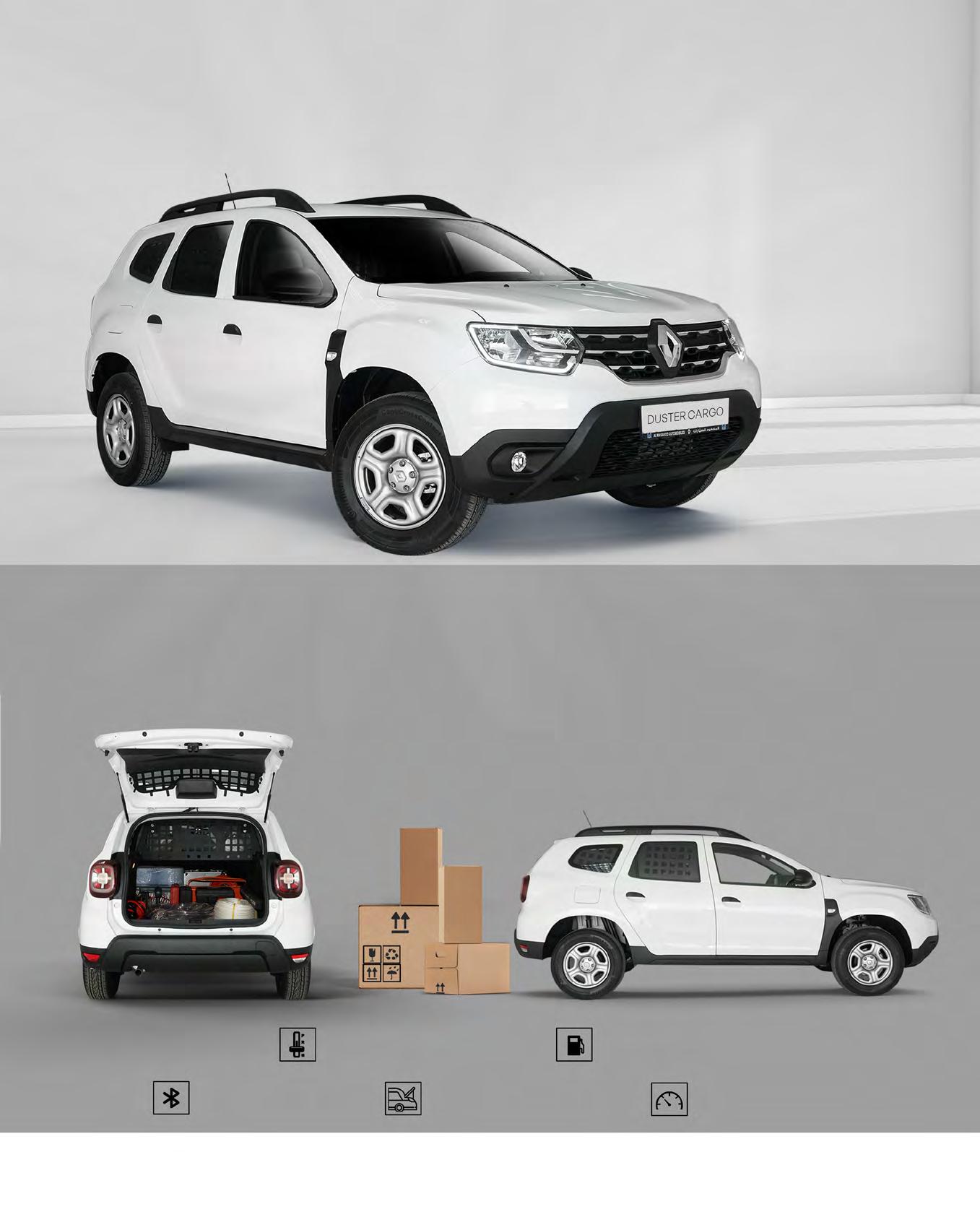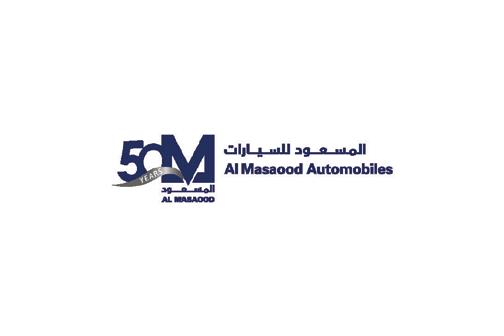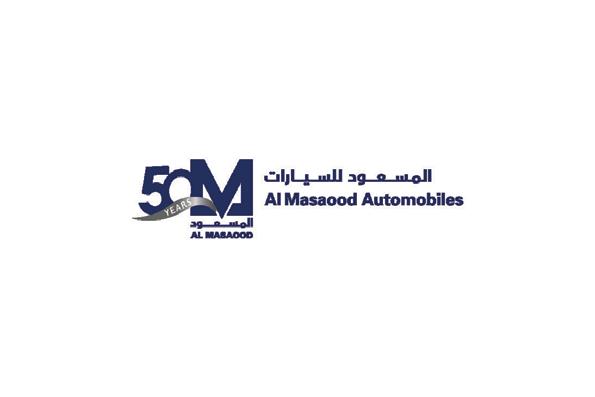The Transporter - A digital transformation

Four industry experts discuss how the logistics sector can minimise the ecological impact and implement sustainable practices

The Transporter - A digital transformation

Four industry experts discuss how the logistics sector can minimise the ecological impact and implement sustainable practices
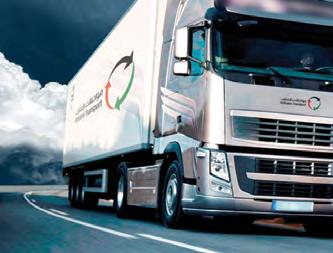
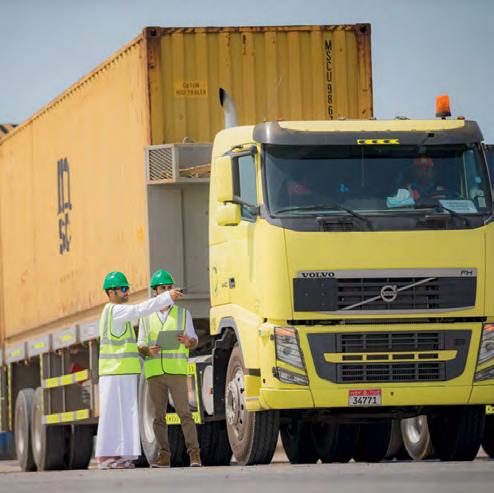





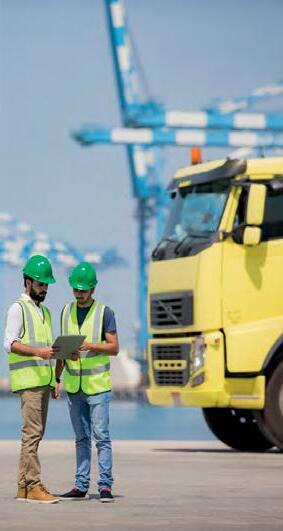












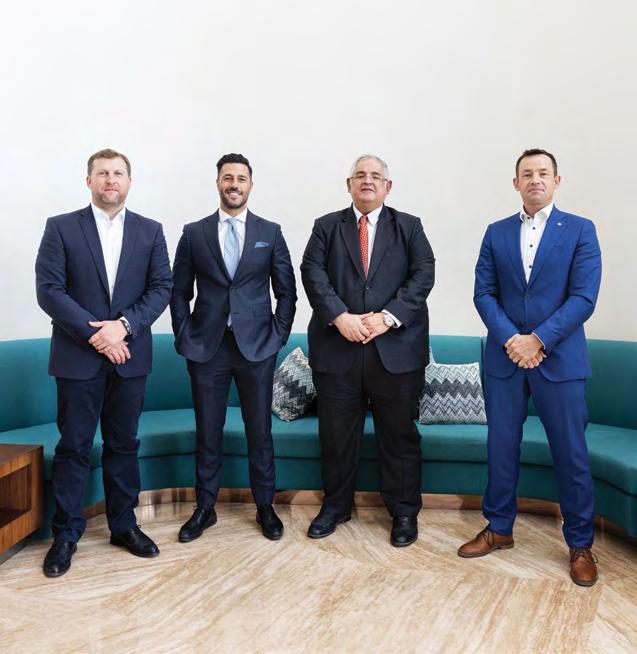
Four industry experts discuss how the logistics sector can minimise the ecological impact and implement sustainable practices


14 INTERVIEW
SIMPLIFYING LOGISTICS THROUGH TECHNOLOGY
dnata recently signed up Kale Logistics Solutions to develop a next-gen eCommerce platform for the cargo community in the UAE. We speak to Kale’s CEO Amar More on how this platform will benefit the logistics industry
26 FREIGHT SOLUTIONS
THE TRANSPORTER - A DIGITAL TRANSFORMATION
Alaa Hawari, General Manager at Transportr, reveals how the pandemic disrupted the traditional logistics sector and accelerated the need for digital freight solutions
28 EXPERT INSIGHT
GLOBAL ALLIANCES AND VACCINATIONS KEY TO FIGHTING COVID-19
DHL believes from 2022 onward, a further seven to nine billion doses of vaccines will be required annually to keep (re-) infection rates low
30 OP-ED MAKING EV / INFRASTRUCTURE SUSTAINABLE
Ashraf Yehia, Managing Director, Eaton Middle East tells us how the demand for electric vehicle charging infrastructure is growing and how it can be cost effective and sustainable for property owners and leaseholders
32 ECOMMERCE EMERGING B2B ECOMMERCE TRENDS
A survey done by Tradeling sheds light on key learnings emerging in the B2B eCommerce sector and outlines how the pandemic caused many businesses to view eCommerce in a new light
36 COMMERCIAL VEHICLE AL MASAOOD AUTOMOBILES
The move comes amidst the car dealership’s changing proposition to address new market needs such as the strong demand for last mile services and improve product mix post-pandemic

This issue we bring to fore sustainability and how the industry is evolving to become greener. Logistics companies and their partners across the globe are taking a more active and aggressive approach to sustainability and environment-friendly operations.
Air carriers such as American Airlines, Air France and KLM have pledged to use sustainable aviation fuel that is derived from waste oils, waste products and forest residues.
Hellmann’s Middle East South Asia recently joined the Air France KLM Martinair Cargo (AFKLMP Cargo) Sustainable Aviation Fuel (SAF) programme and is the first in the region to do so.
DHL Global Forwarding meanwhile has introduced another sustainable marine fuel (SMF) service for ocean freight as part of its sustainability strategy. This is in line with its Mission 2050 of zero emissions logistics.
Brambles, the global supply chain solutions company through the CHEP brand, announced in September 2020 the successful completion of its five-year sustainability programme and the launch of an even more ambitious one, aimed at pioneering regenerative supply chains.
Last month, Maersk contracted Hyundai Mipo Dockyards to build a feeder vessel with a dual engine technology enabling it to sail on either methanol or traditional extremely low Sulphur fuel.
In our roundtable – Green Logistics – the panellists tell us how their companies are adopting environment-friendly measures and are setting themselves either ‘zero carbon’ or ‘carbon neutral’ targets.
Agility, for example, has achieved a 5% reduction in fuel emissions in the UAE after taking stringent steps to reduce its carbon footprint by 25% by 2025 globally. Measures taken include working with carriers to slash CO2 emissions, rethinking warehouse construction and management, piloting use of solar energy in building cooling, and investing in energyrecapture technology for trucks.
We expect the industry in the region to take more proactive steps in this regard and ride on the momentum that has been set by their international peers.
Jochebed Menon Editor, Logistics News Middle East jochebed@bncpublishing.net


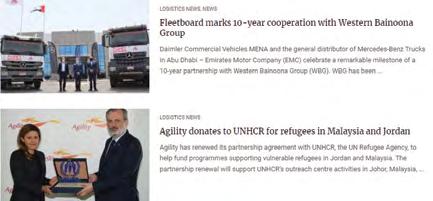
CEO Wissam Younane wissam@bncpublishing.net
DIRECTOR Rabih Najm rabih@bncpublishing.net
GROUP PUBLISHING DIRECTOR
Joaquim D'Costa jo@bncpublishing.net +971 50 440 2706
BUSINESS DEVELOPMENT DIRECTOR Rabih Naderi rabih.naderi@bncpublishing.net +966 50 328 9818
MANAGING EDITOR Kasun Illankoon kasun@bncpublishing.net
EDITOR Jochebed Menon
EDITORIAL DESIGN Christian Harb
MARKETING EXECUTIVE Aaron Joshua Sinanbam aj@bncpublishing.net
PHOTOGRAPHER Alexander Bungas
SUBSCRIBE
subscriptions@bncpublishing.net
For all commercial enquiries, contact sales@bncpublishing.net T +971 50 440 2706 PO Box 502511 Dubai, United Arab Emirates P +971 4 4200 506 | F +971 4 4200 196
All rights reserved © 2021. Opinions expressed are solely those of the contributors.
Logistics News ME and all subsidiary publications in the MENA region are officially licensed exclusively to BNC Publishing in the MENA region by Logistics News ME. No part of this magazine may be reproduced or transmitted in any form or by any means without written permission of the publisher.
Images used in Logistics News ME are credited when necessary. Attributed use of copyrighted images with permission. All images not credited courtesy Shutterstock.
Printed by UPP
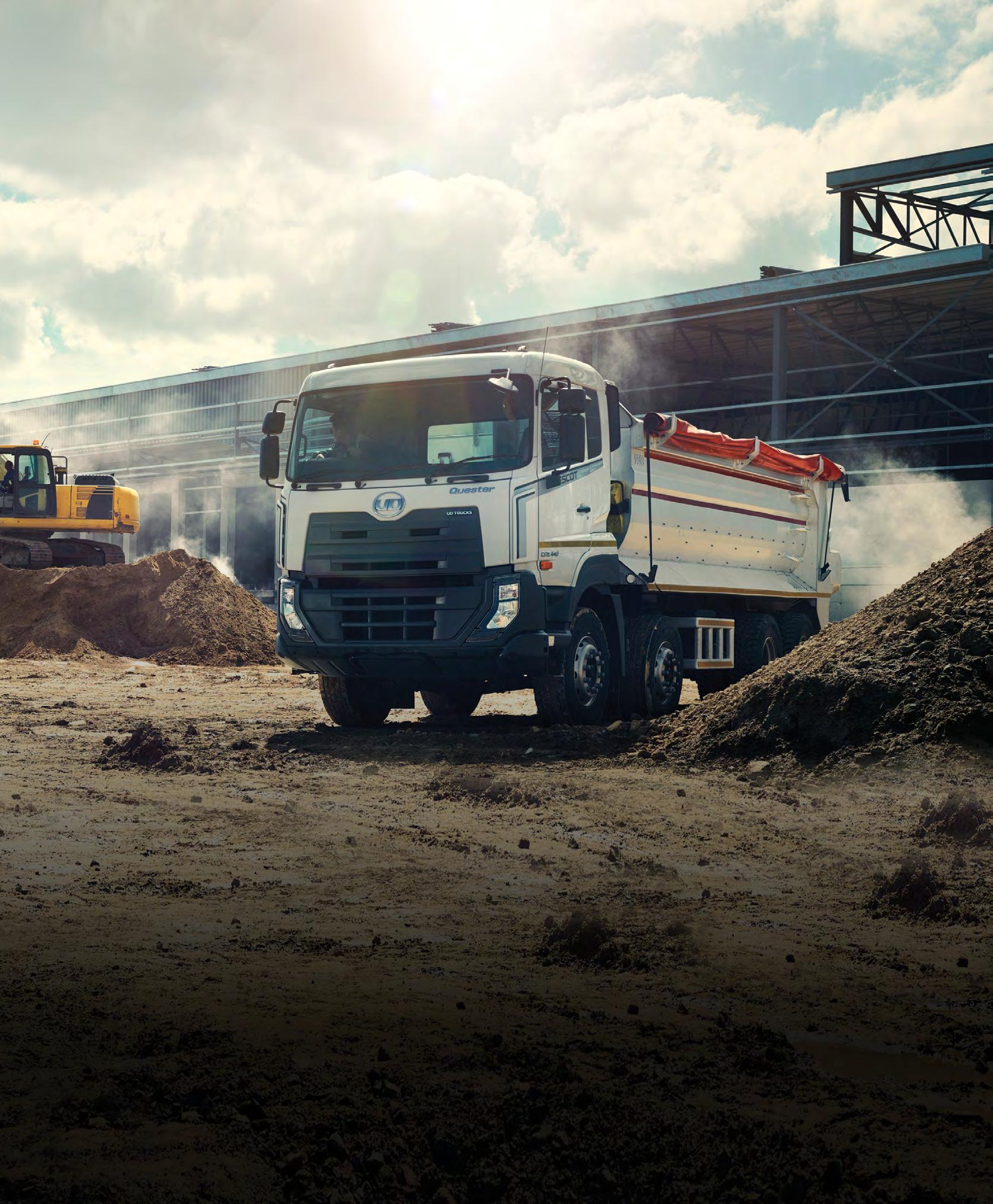



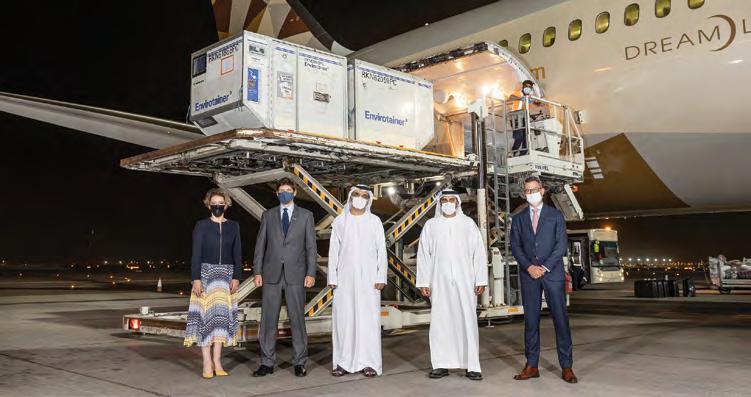
The world’s newest anti-viral treatment for COVID-19, Sotrovimab, is now available for early treatment of certain categories COVID-19 patients in the UAE following a landmark agreement between the Abu Dhabi Department of Health, Rafed, and global innovative biopharmaceutical company GlaxoSmithKline (GSK).
With the arrival of the first shipment yesterday in Abu Dhabi airport, Abu Dhabi become the first location globally to receive this drug.
Sotrovimab is a monoclonal antibody treatment delivered through intravenous therapy. Sotrovimab can be used to treat adults and children above the age of 12 who meet certain criteria and are at risk of progressing to severe COVID-19, as per protocols that have been developed by the National Scientific Committee.
Studies have shown the medicine to prevent hospitalization and death in 85% of early selected treatment cases and can work on all known variations to date. Following USA Food and Drug Agency Emergency use authorization approval, the UAE Ministry of Health and Prevention (MoHAP) issued its endorsement of the new GSK medicine following a national assessment.
Abu Dhabi Department of Health & Rafed executed its agreement with the manufacturer to ensure deliveries as early
as June and July, enabling patients in the UAE to be among the first in the world to access the new therapy.
The National Scientific Committee in MoHAP & Abu Dhabi Department of Health have worked on the treatment protocols that will guide doctors in defining at risk patients and ensuring that they have access to Sotrovimab according to their risk profile and eligibility criteria.
Abu Dhabi-based Rafed will facilitate the procurement, storage, and distribution of Sotrovimab via the Rafed Distribution Centre – the region’s largest specialised cold-storage facility.
The Centre has played a vital role to support the efforts of the HOPE Consortium, and is a milestone collaboration by healthcare, logistics and supply chain entities designed to facilitate the ongoing evolution of Abu Dhabi’s medical and life science offering to combat the pandemic, nationally and internationally.
HE Dr. Jamal Mohamed Kaabi, Undersecretary for the Abu Dhabi Department of Health, said: “Abu Dhabi continues in its efforts to maintain its number one city position globally in terms of resilience and safety in COVID19 times. Through the non-ending support and guidance from our leadership, we continue in our daily preemptive efforts to search, assess, and source through local and international collaboration, the best evidence-based treatment to our popula-
tion in Abu Dhabi, UAE and beyond.
“This medicine is at the forefront of pharmaceutical advancement and is a powerful tool in our fight to end this pandemic. We look forward to implement the eligibility criteria for emergency use of Sotrovimab as part of Abu Dhabi’s commitment to lead an all-encompassing COVID -19 response in prevention, treatment and care.”
As the Department of Health in Abu Dhabi finalises a coherent framework to determine eligibility for Sotrovimab treatment, Etihad Cargo, the cargo and logistics arm of the Etihad Aviation Group, has transported the first batch of Sotrovimab into the UAE utilising its IATA CEIV-certified PharmaLife product.
Tony Douglas, Group Chief Executive Officer, Etihad Aviation Group, said: “This achievement further elevates Abu Dhabi’s leading position in the fight against COVID-19, and firmly illustrates the combined capabilities of those entities at the forefront of the capital’s mission. As the UAE’s national carrier, Etihad has played a critical role facilitating the transportation of vaccines and medical supplies to and from the UAE with its specialist pharmaceutical logistics solution.”
After receiving positive scientific opinion by the European Medicines Agency’s (EMA) Committee for Human Medicinal Products – an important step for the use of the medication for early treatment of COVID-19 across Europe – GSK has submitted an Emergency Use Authorisation (EUA) application to the US Food and Drug Administration and the UAE Ministry of Health and Prevention and got approval from both.
“We have been working very closely with the Department of Health and Rafed since the interim results of the clinical trials with Sotrovimab were available,” said Gizem Akalin, Managing Director and Vice President, GSK Gulf.
“The DOH and Rafed have been agile and passionate about accelerating patient access to promising new treatments to confront COVID-19. Our partnership with DOH and Rafed is holistic, securing early access to Sotrovimab so that the population in Abu Dhabi and UAE will be among the first in the world to get this new treatment,” Akalin said.
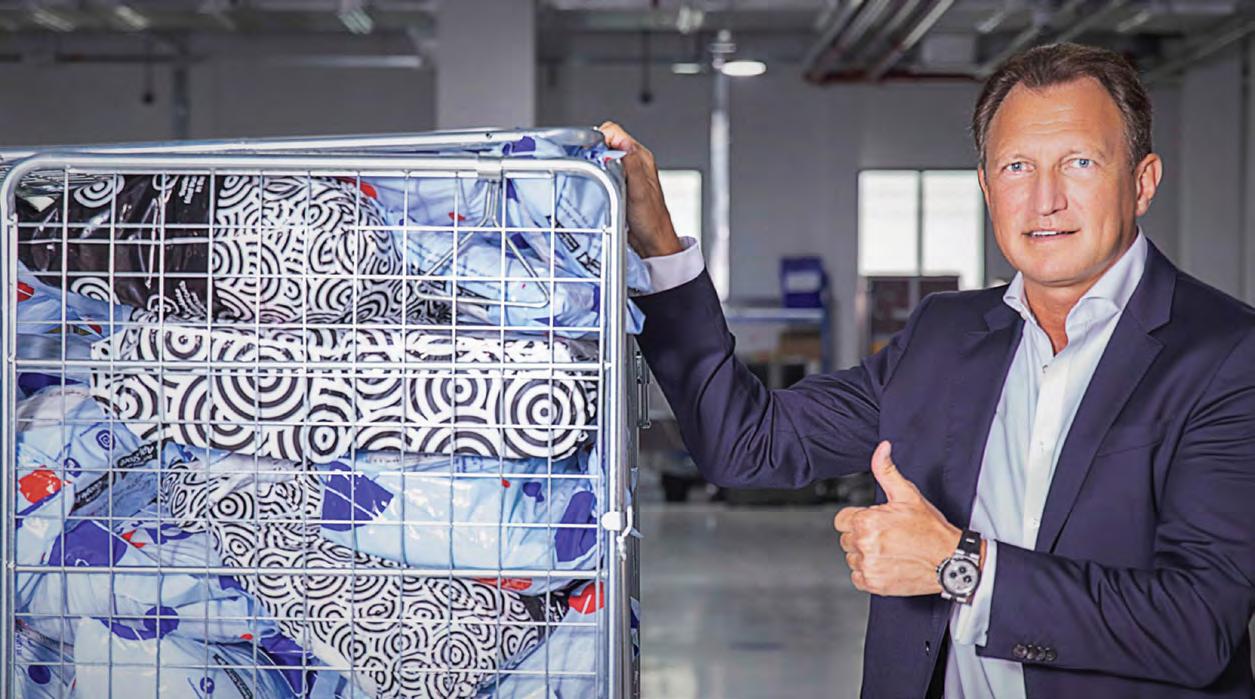
Emirates Post has entered a partnership with UK-based Hurricane Commerce, a provider of secure cross-border eCommerce solutions, as part of its ongoing efforts to ramp up its global eCommerce services and ensure the highest levels of customer satisfaction. The partnership is in line with Emirates Post’s goal of becoming a multinational businessto-consumer (B2C) post and parcel service provider and contribute to enhancing the UAE’s position as a leading global hub for trade and logistics.
Through the partnership, Hurricane Commerce will enable Emirates Post to apply leading data solutions for its international business unit to develop modern services to customers. This also coincides with Emirates Post’s ongoing investment in digitisation across all its systems and processes to accelerate its transformation into a global commercial operator.
Peter Somers, CEO of Emirates Post, said:
“This partnership is part of our investment in our international parcels expansion as we strive to become a strategic gateway for cross-border eCommerce traffic.
“This is one of our top priorities at Emirates Post, and to achieve this will require that we work with the best in the industry, hence our partnership with Hurricane Commerce. The knowledge and experience of the Hurricane team and the quality of their data solutions will enable us to take a monumental leap towards fulfilling our crossborder eCommerce growth strategy.”
David Spottiswood, Co-Founder of Hurricane Commerce, added that Emirates Post sees the importance of applying data solutions not only to ensure flawless crossborder trade, but also to provide its customers with the best services and experience.
“With the global eCommerce industry implementing new rules and regulations at an ever-increasing rate, such an action taken recently by Emirates Post has never been more relevant,” he said.
“THE KNOWLEDGE AND EXPERIENCE OF THE HURRICANE TEAM AND THE QUALITY OF THEIR DATA SOLUTIONS WILL ENABLE US TO TAKE A MONUMENTAL LEAP TOWARDS FULFILLING OUR CROSS-BORDER ECOMMERCE GROWTH STRATEGY.”
Privately-owned independent port operator Gulftainer has appointed Javier Echeverria as its new chief financial officer (CFO).
According to Gulftainer, the recruitment of Javier is the next step towards the continued growth and international expansion of the port operator.
Charles Menkhorst, CEO of Gulftainer, said, “Javier is a proven leader in finance with a superior track record of delivering results and creating value. After a rigorous global search process, I am excited to welcome Javier to the Gulftainer group.
“I
LOOK FORWARD TO EXECUTING THE COMPANY’S PRIORITIES, AS WELL AS ACCELERATE GROWTH AND ENHANCE VALUE FOR SHAREHOLDERS AND ALL STAKEHOLDERS.”
“He is a high-impact executive who brings a compelling blend of strategic and capital allocation discipline, well-honed operating skills, and transformational leadership abilities.”
In his previous role, Javier served as regional finance manager of the Euromed & Americas Region for the Singaporean company PSA, based out of Antwerp, Belgium. He managed a multi-billion business driving its financing strategy and performance since 2019, with a portfolio of assets spanning across 11 countries including the USA.
Javier joined PSA in 2014 as regional head of finance for the LatAm Region based in Panama. He is a leader with a track record of delivering profitable growth for

supply chain companies. He holds business degrees from INSEAD and IESE Business School.
“I am excited to join Gulftainer, which has a strong reputation in the market for its operational excellence. I look forward to executing the company’s priorities,
as well as accelerate growth and enhance value for shareholders and all stakeholders,” Javier said.
“I am inspired by the team’s dedication to solid strategic growth while positively impacting the world coupled with its commitment to employees and customers.”
Dnata has partnered with Kale Logistics Solutions to develop a next-generation eCommerce platform for the cargo community in the UAE.
The partnership will see the two companies take dnata’s existing platform, CALOGI to a new level to provide best-in-class, one-stop services, including appointment and customs services management, to customers through advanced digital solutions.
Bernd Leo Struck, dnata’s Senior Vice President for UAE Cargo and DWC Airline Services, said: “We constantly invest in digital solutions to improve customer experience and deliver world-class value for our partners.
“Our new eCommerce platform will help our supply chain partners and customers in Dubai optimise their operations and reduce costs through improved processes and enhanced visibility into their businesses.
“It also paves the way for a more sustainable business model, promoting paperless and cashless trade through collaboration and automation. We look forward to working with Kale on this exciting project.”
dnata launched CALOGI as an eCommerce platform in 2008 in Dubai. It offers a comprehensive, highly integrated, cost-effective trading platform to air cargo supply chain stakeholders, including general sales agents, airlines,
forwarders, third-party logistics providers and ground handlers. Built mainly for small-to-medium enterprises (SMEs), CALOGI enables the cargo community to seamlessly trade in a paper-free environment.
dnata’s next-generation community platform will deliver additional benefits for the cargo community. It will connect partners with their customers and authorities on one platform, sharing information in real time among all users.
Customers will be able to integrate the platform into existing workflows through APIs (application programming interface) and take advantage of all innovative functions while interfacing with their own system.
The platform will also help customers simplify existing processes quickly and efficiently, without investing in multiple systems.
Amar More, CEO of Kale Logistics Solutions, said: “We are immensely proud to collaborate with dnata in creating the next generation community eCommerce platform in Dubai. dnata and Dubai set an extremely high benchmark for the logistics industry, and we are happy to contribute to the growth of cargo in the region.
“We are confident that with our proven platform and with dnata’s partnership and experience, the Dubai cargo community will benefit immensely through the platform.”

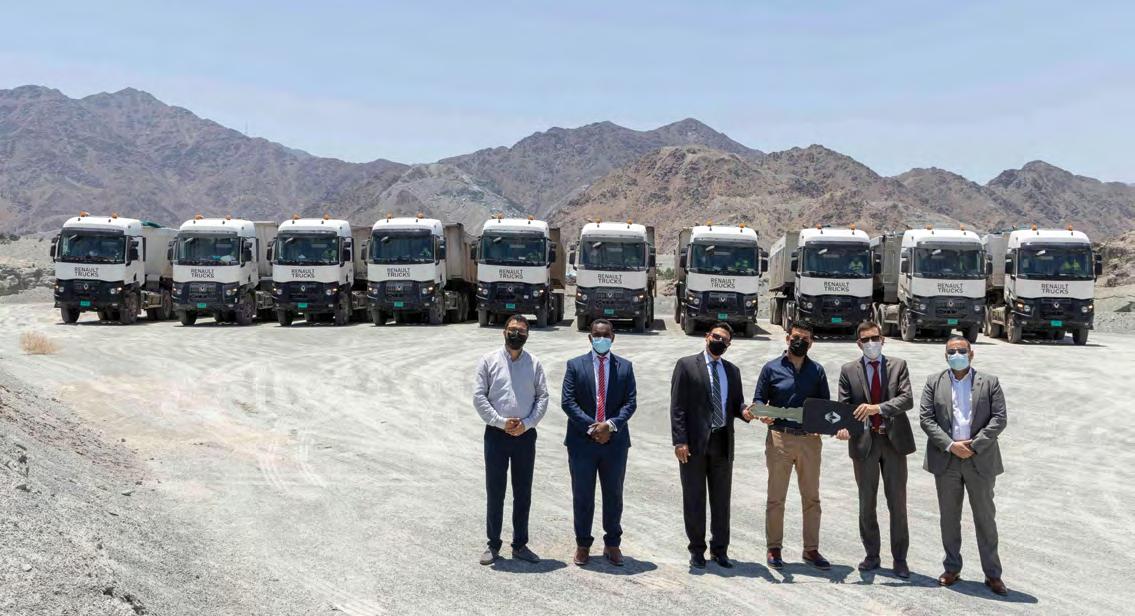
Renault Trucks has delivered ten K 480 heavy-duty construction models to one of the UAE’s leading construction material transportation companies, Al Jadawel Land Transport.
The ten Renault Trucks models are part of a total fleet size of 98, and Al Jadawel Land Transport plans to turn the whole fleet to Renault Trucks by end of next year.
The Fujairah-based company will be using the new models, which have been supplied by Renault Trucks’ partner in the UAE, United Diesel, to transport aggregate from the crushers in the Northern Emirates across the country.
The Renault Trucks K 480 Tractor Head 6×4 models purchased by Al Jadawel Land Transport deliver the highest levels of driver comfort, reliability, and fuel efficiency.
They are equipped with a range of features that are designed to optimise productivity, minimise downtime, reduce operation costs and maximise profitability. Designed to operate in extreme conditions, their outstanding technical capabilities meet and exceed customers’
day-to-day requirements.
The K 480’s well-appointed cab is built around the driver. All controls are at the driver’s fingertips, while there is also a 7’’ HD LCD information display and seats with fitted red seat belts. The design of the windshield and side mirrors guarantee clear visibility around the cab with minimum blind spots, helping keep both occupants and road users safe.
There are numerous safety features designed to assist the driver in difficult conditions, including EBS (Electronic Braking System), Hill Start Aid (HSA), AntiSlip Regulation (ASR), Anti-lock Braking System (ABS) and Emergency braking assist (AFU). A Tyre Pressure Monitoring system (TPMS) is also fitted to ensure operators benefit from the maximum lifetime of the tyres.
The K 480 model is equipped with a fuelefficient DXI 13 Euro 5 engine, developing 480 hp and torque of 2,400 Nm, and an Optidriver gearbox with automated clutch. They combine to ensure the highest standards of productivity while minimising fuel consumption and reducing operating costs. Cruise control is also fitted as
standard on C & K ranges.
Najah Al Tahir, owner of Al Jadawel Land Transport, commented: “We are incredibly proud to have struck this deal with Renault Trucks. With operations across the UAE, which is known for its tough terrain and high temperatures, we require trucks able to withstand these harsh conditions. The brand’s range has a reputation for being able to meet and exceed our needs, which is why we aim to switch our whole fleet to consist only of Renault Trucks models by 2022.”
Commercial Director of Renault Trucks Middle East, Guillaume Zimmermann, said: “Al Jadawel Land and Transport’s purchase of K Range models is testament to the truck’s robustness and its recognised contribution to the construction and transport business around the region.
“Renault Trucks’ K Range leads the way in terms of fuel economy and uptime, which are key in this very demanding segment. We are seeing more and more customers working with crushers in the Northern Emirates shifting to K models, which is certainly not a coincidence!”
The logistics and supply chain startup Trukkin has secured an investment round of SAR26 million (USD7 mn) for its Series A round. The financing was led by Saudi based Emkan Capital with the participation from Impact46 Seed Fund, Taya Group, and other strategic investors.
Founded in 2017 by former Barclay’s banker Janardan Dalmia, Trukkin is an aggregator that digitises the process of matching shippers with truckers to bring about transparency, reliability, and efficiency to the logistics industry.
Trukkin also works towards building fintech solutions for payments, insurance, and financial services. These solutions lay the groundwork for more financial inclusion for the unbanked and increase much needed transparency and efficiency for suppliers.
Janardan Dalmia, Founder and CEO of Trukkin, said: “I’m immensely proud of the team and the growth we’ve achieved over the course of the last year as we expanded into Pakistan and grew revenues despite the difficult environment presented by COVID.
“We are excited to close the round with strategic investors like Emkan Capital and Impact46, it confirms our vision of creating a world-class regional aggregation platform to enable logistics for the shippers and transporters.”
Since its launch in Pakistan, Trukkin has continued to invest in technology and expand its services to newer markets while deepening their presence further in Saudi Arabia and the UAE.
Ghassan Aloshban, GP at Emkan Capital, said: “Trukkin has exhibited incredibly efficient use of capital and we’re
impressed with what they’ve been able to achieve in such a short time frame. Its core team with over 200+ years of combined industry experience have showcased their expertise in not only navigating but driving growth during the pandemic.”
The Impact46 team added: “The Trukkin team has shown its unique ability to build businesses across multiple geographies in three years while retaining the strong culture of the company. We are confident in their ability to build, manage, and scale the business.”
“We see enormous growth potential in the logistics industry in the MENAP (Middle East and Pakistan) region, the size of the market is considerable at over USD50 billion. Currently, local fragmented players dominate the market in the region, and we are working to be an enabler that brings this fragmented market together on an integrated, world-class platform to showcase collective growth,” Janardan said, while commenting on the platform’s future.
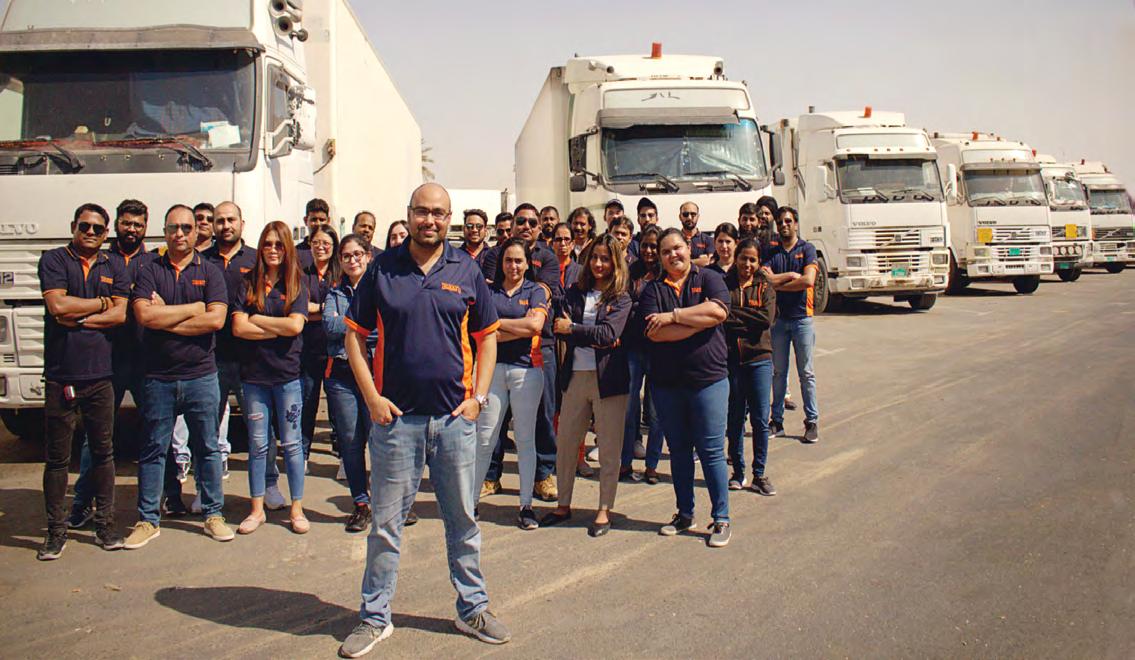
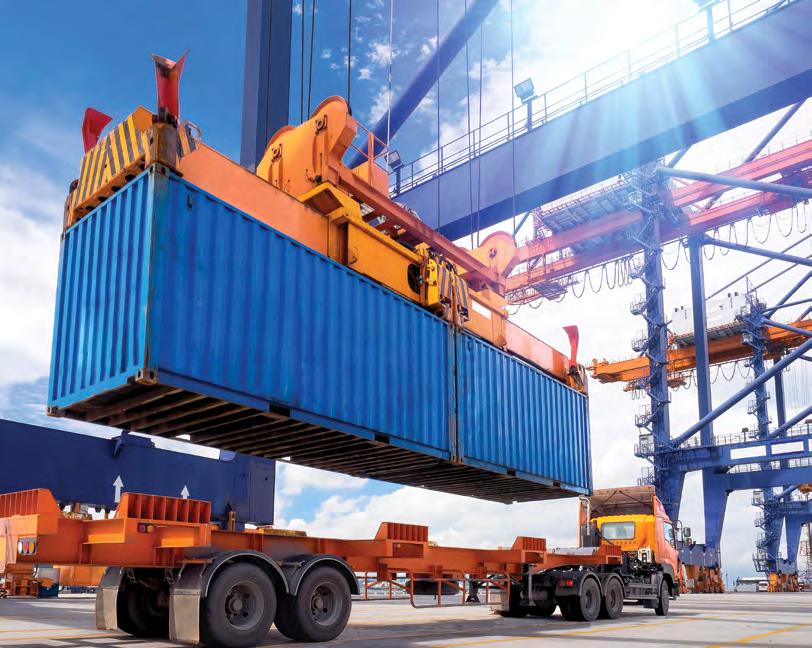
DNATA recently signed up KALE LOGISTICS SOLUTIONS to develop a next-gen eCommerce platform for the cargo community in the UAE. We speak to KALE’S CEO AMAR MORE on how this platform will benefit the logistics industry
Tell us about Kale Logistics and your solutions for the logistics industry?
Kale Logistics Solutions was built on the platform of deep industry knowledge and technical expertise. Until date, Kale serves as the harbinger for many technologydriven solutions that have changed the face of the logistics industry worldwide.
Kale’s community and enterprise solutions cater to a wide network of Logistics service providers (LSPs) who have
strengthened and improved their operational and business capabilities. Most notably, we have been the recipient of United Nations awards on several occasions.
Why logistics?
Logistics as an industry has a vast definition. It involves various stakeholders ranging from exporters, freight forwarders, terminal operators, ground handlers, transporters, customs brokers, airlines,
shipping lines, airports, ports to name a few. Therefore, the industry’s structure is chaos prone. With numerous networks and players in the logistics industry, digitisation and incorporation of technologies make the sector more advanced, connected, and lucrative.
Between risk mitigation, cost optimisation, and increased customer satisfaction, automation has become the cornerstone for heightened efficiency in the logistics sector. Hence, to transform the operations, we require the intervention of technology. With technology, the industry can reduce ambiguous tasks and cut down the delays in operations.
For a single cargo shipment to move it takes close to 30 documents, 100 copies and 120 physical signatures. This nature of documentation leads to operational delays, lack of transparency and lack of trade visibility. Automation, paperless trade, and digitisation of operations is the need of the hour.
Expand on your relationship with dnata and what the eCommerce platform will do.
Dubai holds platinum standard in the logistics industry and dnata is one of the top five handling companies in the world.
A decade ago, the airport had launched an eCommerce platform, which is the world’s leading paperless air cargo solutions portal offering a reliable, secure, simple, and cost-effective eFreight business solution.
Now, dnata wants to enhance this platform and make it future ready for the next 15 years. They conducted an incredibly detailed exercise of finding the right partner to build this next generation system on the existing system. After three years of evaluation, finally they signed up Kale. The first phase is to upgrade the existing system and in phase two take it to other locations across the world which may be over 40 airports.
This collaboration will bring about various strategic advantages like establishing a digital trade corridor between Dubai and other airports and are run on Kale’s platforms. Therefore, Dubai can have a global air network, which will be the industry’s first such global network. This will be a case study on how Dubai is creating digital infrastructure to connect the entire world.

“BETWEEN RISK MITIGATION, COST OPTIMISATION, AND INCREASED CUSTOMER SATISFACTION, AUTOMATION HAS BECOME THE CORNERSTONE FOR HEIGHTENED EFFICIENCY IN THE LOGISTICS SECTOR.”
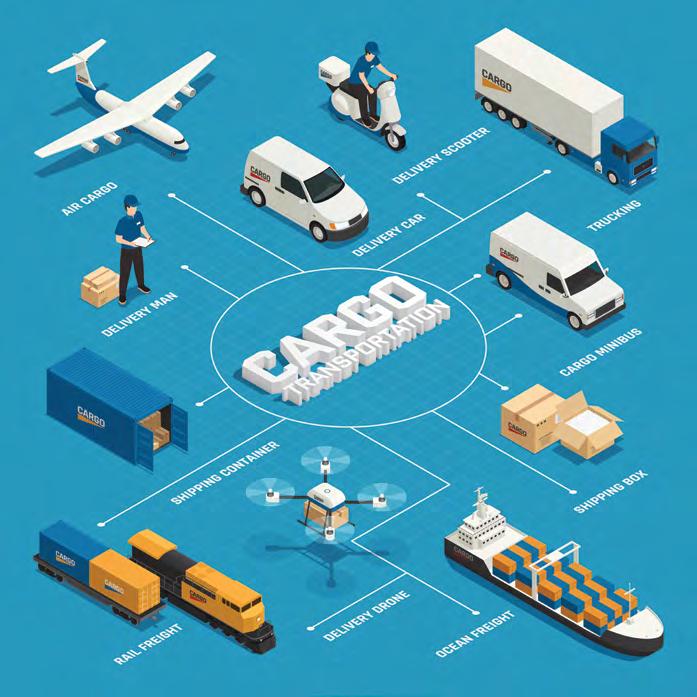
The excellence created in Dubai will be replicated by dnata at other airports. The new platform promises to connect partners with customers and authorities in one place, sharing information in real-time among all users.
Customers will be able to integrate the platform into existing workflows through APIs and take advantage of its functions while interfacing with their own systems. The platform will also help customers simplify existing processes quickly and efficiently, without investing in multiple systems.
Talk about the importance of an airport cargo community eCommerce platform. The Dubai logistics community will experience an all-new level of performance post implementing the new community platform developed by Kale. The new technology that will be introduced will ensure the user new experience and speed of operations going up by few notches. DP World and Emirates launched seaair products earlier this year to connect
Jebel Ali and Emirates SkyCargo. What is unique with the new system is the air-sea logistics integration, where Dubai will see a common platform that will connect both air and ocean Logistics.
Usually, 40% of cargo moves between sea and air. With the sea-air corridor, the entire supply chain will be more coordinated with complete transparency. This new system will act as a single window where regulatory bodies, dnata, airlines and other supply chain actors can transact and share information.
How vital is it for the supply chain and logistics community to implement next-gen IT solutions?
COVID-19 has pushed the logistics industry over the technology tipping point. In just a few months, the crisis brought about years of change in the way logistics companies across the globe do business. The companies have accelerated the digitisation of their customer and supply-chain interactions and of their internal operations by three to four years.
The share of digital or digitally enabled products in their portfolios have accelerated by a shocking seven years. We are helping build the digital capability required to emerge stronger from every phase of this crisis-whether it is the phase of respond, rebound, or re-imagine.
What are some of the challenges the logistics industry is facing and how technology can be of assistance?
Prior to March 2020, like most other industries, the logistics industry, too, was undergoing a gradual yet permanent transformation in terms of technological adoption. However, since the onset of the pandemic, the logistics industry found itself at the forefront of disruption with heavy restrictions on the movement of goods and people.
The pandemic not only tested supply chain resilience and efficiency to the hilt but also paved the way for accelerated technological adoption across the sector. Here is how technology plays a pivotal role in enhancing the logistics sector’s operational efficiency.
Complete visibility of the consignment - Visibility in the logistics domain relates to being aware of what is happening to your consignment from the beginning to the end. While this seems deceivingly simple, achieving complete visibility of the consignment while following a traditional, manual business approach is an arduous, time-consuming process.
Milestone-based tracking - Real-time tracking of shipments has indisputably been a game-changer in the logistics industry. Today, by deploying technologies such as AI, ML, IoT, and data analytics; logistics service providers through dedicated customer portals, help companies and other logistics value chain stakeholders get access to milestone-based tracking, thereby enabling them to view the details of the shipment from one hub to another along with the exact date of delivery.
Route optimisation - In a nutshell, route optimisation is the process of discerning the most cost-effective route for a vehicle carrying a shipment.
Paper-less offices and virtual payments - A no-brainer, the advent of technology and widespread digitisation have given way to paperless offices, especially in creating applications for key documents.
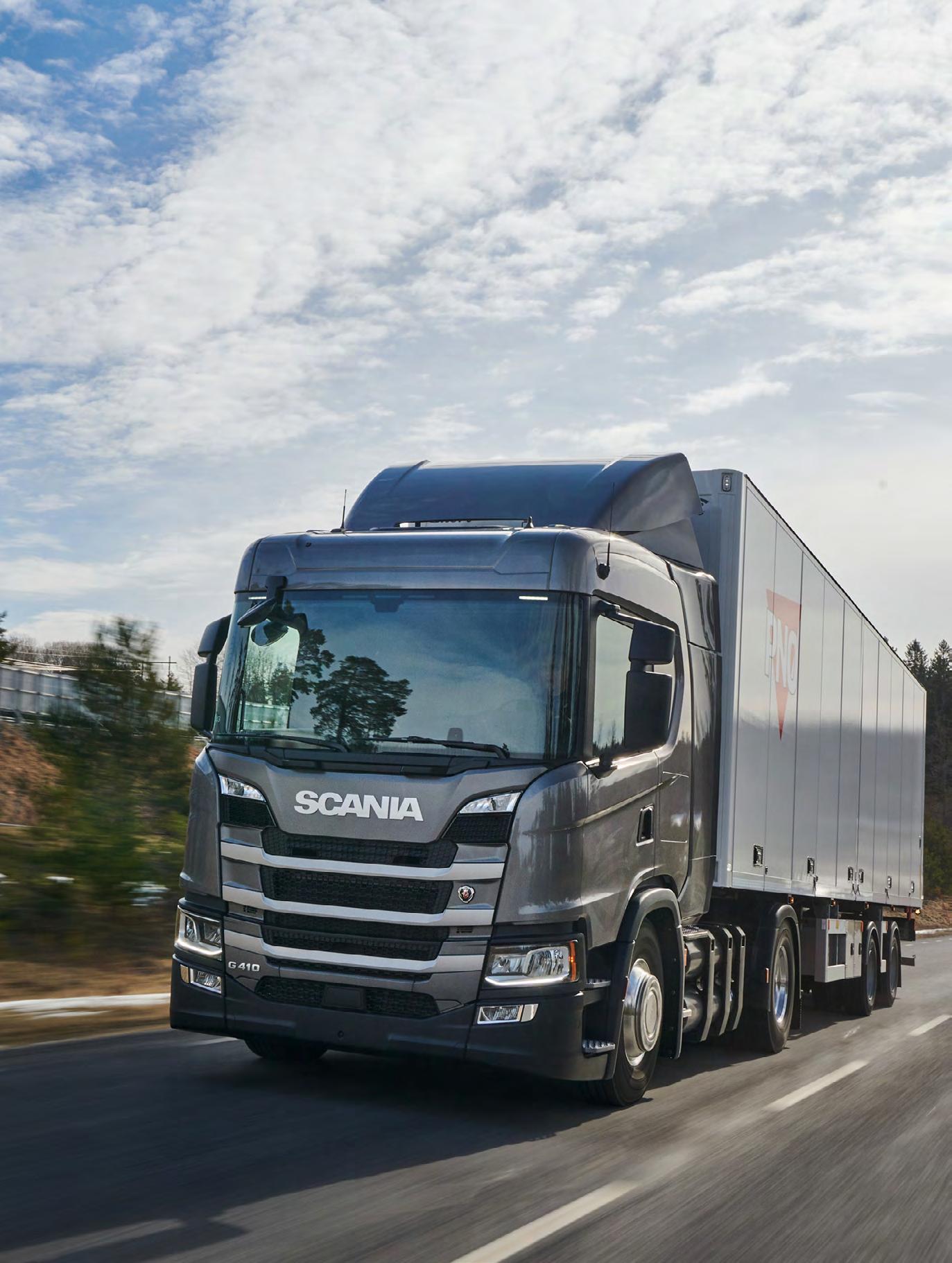

Choosing a gas powered truck will put you and your fleet in the forefront of sustainable truck operations, reduce your CO2 emissions and achieve Euro 6 Emission Legislation without using Adblue or Particulate Matter. Well suited for both urban and regional operations. It can be matched with R, G, L or P cabs and combined with either the Scania Opticruise gearbox or automatic transmissions.
For more information about our Alternative Fuels options, please visit www.scania.com/ae/en/home/products-and-services/articles/alternative-fuels.html
Minimising environmental impact







Logistics News Middle East sat down four industry experts to discuss how the industry can minimise the ecological impact and implement sustainable practises
The transport industry – which includes the cargo sector – is one of the largest contributors to greenhouses gas emissions. The need to curb these emissions have been in the works for years now, however the momentum has picked up recently.
Several car, bus and truck manufacturers have announced a timeline of producing only electric fleets or introducing hybrid vehicles that use alternative fuels and do less damage to the environment. Logistics companies all over the world too are announcing sustainable fuel programmes.
Participants in the Logistics News ME roundtable acknowledged that the shift has come from both the policy makers and endconsumers who see themselves and global citizens.
Hani Tannir, Group Head of Commercial at Al Masaood for the Trucks and Heavy Equipment division believes that awareness is the first step towards sustainability, and it must be a voluntary effort and not policy makers driving the shift.
“The best way for a long-term sustainability solution is to be convinced rather than coerced to become better global citizens. This comes with awareness and leaders achieving
certain targets that they promised to achieve, and that then becomes the standard.”
He adds: “There must be a constant need to get better not just more efficient but how to become better global citizens. I hope we can achieve it in green logistic, because that then becomes a scale we need to improve on.
“If we achieve something then that becomes the scale, and then we move forward from there. It must happen, because by all indications if it does not then our generation has caused a disaster.”
Hani is right, logistics companies and vehicle manufacturers need to understand that their operations are contributing to CO2 emissions and find solutions to cut it down, and many are already setting themselves green goals.
Hans Wising, Sales Director for Scania Middle East, reveals that the Swedish manufacturer is committed to achieving a fossil-free commercial transport system and electric vehicles are a crucial part of that journey.
“Driving Scania’s shift into sustainability has become our purpose and part of our core strategy. Together with our customers and partners, we are driving the shift towards a sustainable transport system. We need to break away from the correlations between increasing demand for transport and the increase in carbon emissions, noise, congestion,
and accidents. We are investing a lot in finding sustainable solutions. And we also believe that sustainable solutions will be the new normal,” Hans notes.
Kuwait headquartered Agility is off the same thought, its goal is to reduce its carbon footprint by 25% by 2025 globally. Ayman Kabbara, Commercial Director, explains: “Agility is taking aggressive steps to get greener. We are working with carriers to slash CO2 emissions, rethinking warehouse construction and management, piloting use of solar energy in building cooling, and investing in energyrecapture technology for trucks.
“Agility’s approach is to make our own operations sustainable, as well as the supply chain in partnership with our customers and suppliers and invest in companies championing green technologies that will reshape the future of our industry.”
For Daimler Mercedes-Benz sustainability means permanently creating value for all stakeholder groups that includes its customers, employees, and investors as well its business partners and society.
Johannes Faatz, Head of Business Development,
Mercedes-Benz Trucks, says: “There are several perspectives on the sustainability of logistics operations and the delivery of goods. On the one hand we are providing our partners with vehicles which are of the latest technology - in term of safety and fuel efficiency. And on the other hand, is the manufacturing side of it.
“Daimler Truck AG announced in 2019 that all European truck plants shall be CO2 neutral by 2022. Our FUSO production site in Tramagal, Portugal for example achieved that milestone by an increased use of renewable energy sources and process modifications. In general, the strategy of Daimler is to offer a CO2 neutral solution up to 2039 that means we only put CO2 neutral vehicles on the road.”
A relevant solution
Geographic location, climate and regional regulations play a big part in how green logistics can be implemented. Johannes explains: “For us to offer trucks with lower carbon emission in the region, several factors have to be taken into consideration.
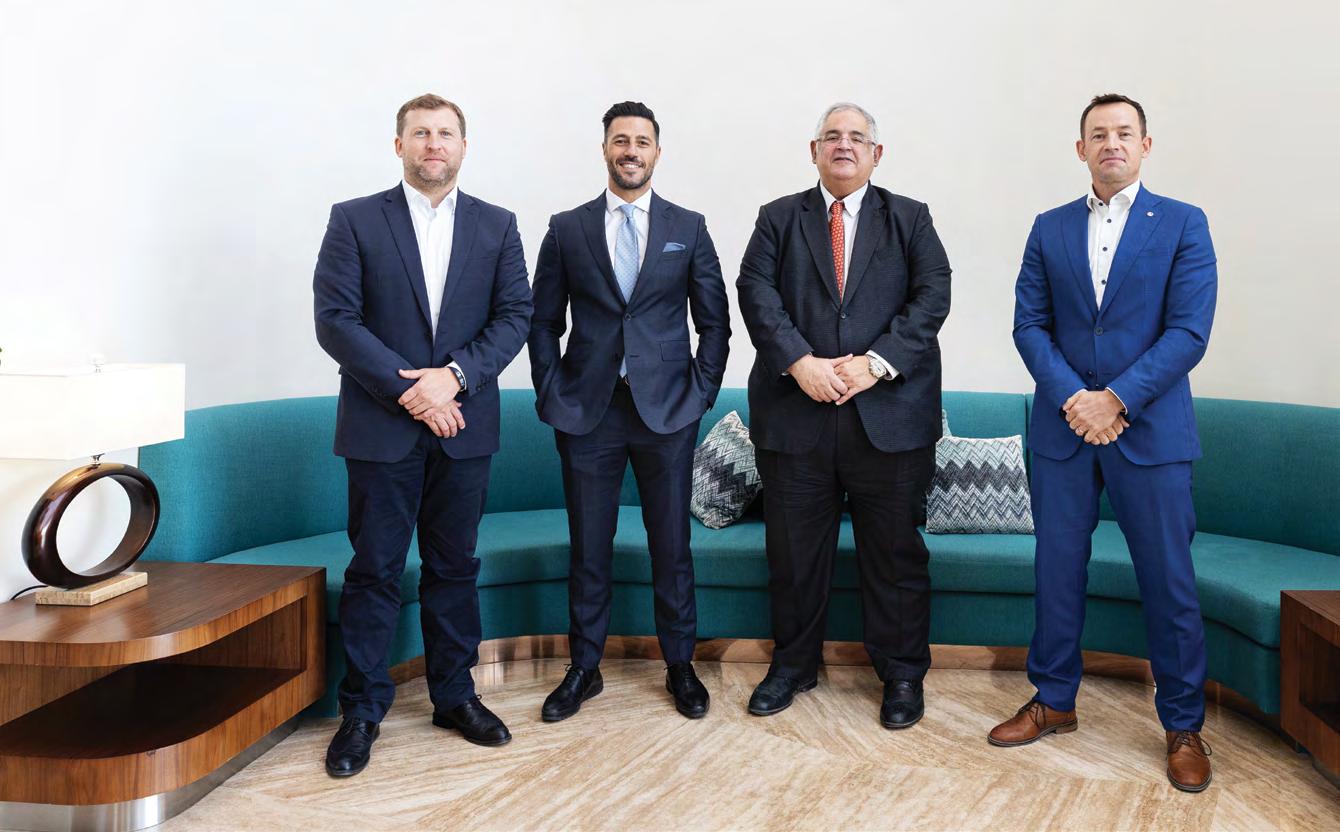

“The most important aspect being the availability of the right fuel for the right emission norm. In Europe, Euro VI is mandated by the government. Here in the UAE, Euro IV is compulsory as per the law. When we launched the new Fuso Canter Range in December, we decided to go one step further we directly launched a Euro V emission norm because the fuel is available. Less fuel is consumed on these trucks, it has multiple options and benefits for the customer therefore we went one step further.
“When we look at the region, we have markets that are not able to supply the right fuel to bring the latest technology. So, I think that this is the major huddle, which is existing. The next challenge is to train the operators in the best possible way, so they know



how to use the systems which are available in the truck.”
Hans has a similar opinion. “There are several ways we can bring our CO2 emissions down. We can optimise the truck for each application and thereby reducing fuel consumption. The climate here plays an important role in fuel consumption. Vehicle idling is very prevalent, in some cases we see that more than 50% of the journey time the truck in idling - cooling the cab basically. We need to look for alternative ways to cool the cabin or further optimise journey times.”
He adds: “Another factor is vehicle maintenance - trucks needs to be serviced regularly to run efficiently. Additionally, can we get rid of old trucks out on the roads that are heavily polluting the roads.”
With the environmental conditions on the extreme side and the region an emerging market there are several factors to be considered, according to Ayman.
“What infrastructure is available in the UAE is not necessarily offered in the rest of the GCC and the Middle East. What we really are struggling with in this region is the scarcity of biofuel and the fact that even if you have an electric car today it will not be very efficient due to the lack of enough charging stations.
“There is an upward trend in the US and Europe to electrify trucks and there is a market for this. It will not be used on the long routes now, but it will be efficient for the eCommerce business - last mile deliveries,” he explains.
“But for biofuel, alternative fuels, hydrogen cells and electric options to be efficient and available in the market we need to work on the infrastructure this not only include the charging stations but the actual road infrastructure.
“The other huge challenge is the abundance of cheap fuel compared to the rest of the world. And for us to choose green options, it must make sense financial and commercially.


When shifting from petrol/ diesel engines to an electric alternative, it must make sense in the books. Let us first start with biofuel and there should be additional incentives or tax breaks from the government in the Middle East,” he notes.
Ayman believes that logistics companies need to be incentivised to lower their carbon footprint. “The only incentive that I see today is the type of customers we are dealing with and whether they have a green target. This target means they must look for greener options, this is an area which we can contribute to, an area we can help towards achieving a target.
“Part of our green strategy is to collaborate with partners that have a similar strategy that want to drive their emissions rate down. But at the end of the day, economically it must make sense.”
Hani does not see the UAE government incentivising companies to operate green fleets or imposing a taxation structure to encourage the logistics industry to implement a more environment friendly approach, rather he believes it is a collective effort by all stakeholders.
“In the UAE it has always been more of a gentle push than a harsh policy. The government kindly encourages everyone to be more sustainable and community in general has responded, but of course the economic calculation of cost benefit is particularly important. In terms of the infrastructure for electric fleets there are various options that can solve the charging availability.”
“Electric charging for trucks is not difficult to achieve. Various companies including Al Masaood are working on finding solutions to provide electric charging points throughout the country and that will encourage people to choose greener options. It is about encouraging the transporters, the logistics companies, and the contractor to migrate to cleaner energy rather than forcing or taxing the solutions,” he says in conclusion.
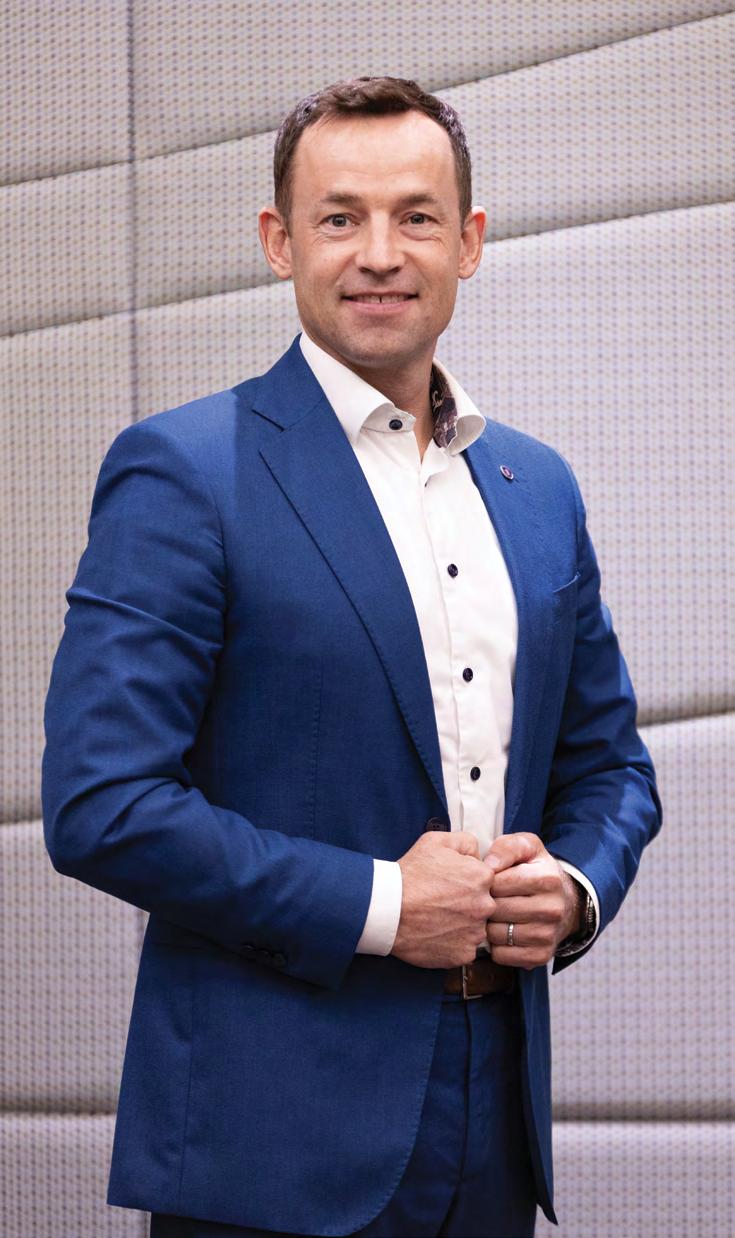
Hans has been the sales director of Scania Middle East, which is one of 40 Scania commercial business units around the world since January 2019. In this role, he is responsible for the development of Scania’s sales and support system for the dealer network in the Middle East.
Hans joined Scania as a trainee back in 2000 and has held various positions within the central sales and marketing organisation in Sweden as well as in the commercial Scania network. Before joining Scania Middle East, Hans was the service and parts director for Scania in Japan.
Hans holds a master’s in industrial engineering and management from the Chalmers University of Technology in Gothenburg, Sweden.
“DRIVING SCANIA’S SHIFT INTO SUSTAINABILITY HAS BECOME OUR PURPOSE AND PART OF OUR CORE STRATEGY. TOGETHER WITH OUR CUSTOMERS AND PARTNERS, WE ARE DRIVING THE SHIFT TOWARDS A SUSTAINABLE TRANSPORT SYSTEM.”
Hans is an expert ice hockey player and is fond of thrill-seeking sports such as downhill skiing, mountain biking and kitesurfing. He has been to more than 55 countries around the world, and once travelled in a new Scania truck from the factory in Sao Paulo, Brazil to Santiago in Chile, a journey of 3,300km. He is a licensed heavy truck driver.
“I have worked as a sea captain of motor yachts in Spain. I lived in Canada for a year as a student. As a student, I also spent time in Ghana working at a foundry and worked in Japan for Scania. One of my brothers work for Volvo but I have been with Scania for 21 years,” he says.



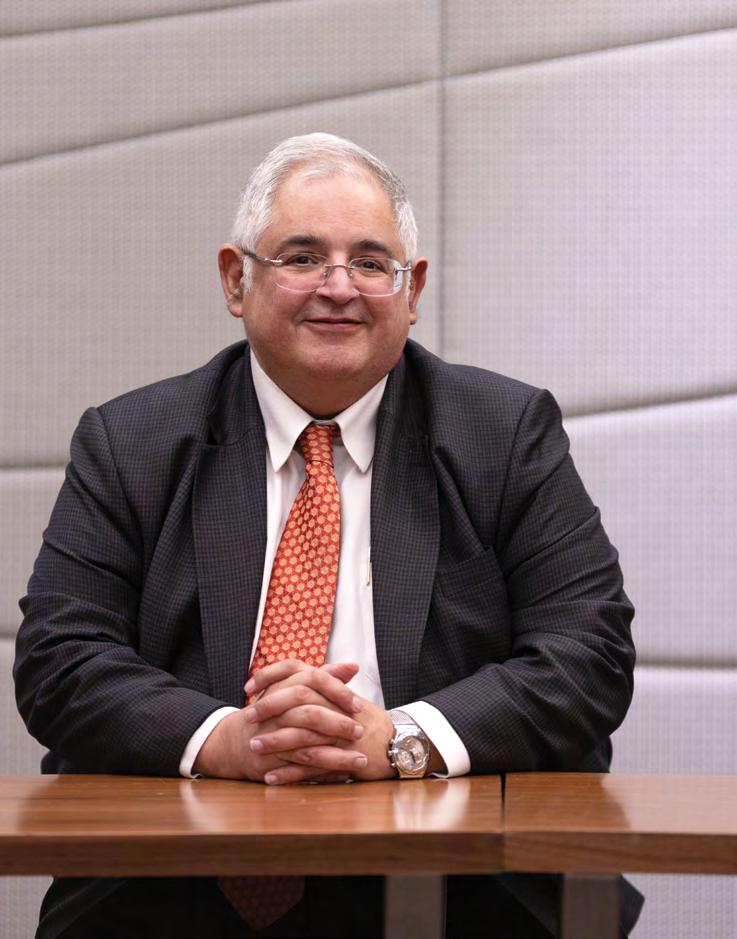
Known for his wealth of leadership experience, Hani brings to the Group the strong business network he has established over the years across the Middle East, North Africa, and Sub-Saharan Africa regions.
His proven track record of closing ‘big ticket’ business deals serves as the key to the tactical rollout of strategic plans that creates new revenue streams for Al Masaood and bolsters the business development operations


“THE BEST WAY FOR A LONGTERM SUSTAINABILITY SOLUTION IS TO BE CONVINCED RATHER THAN COERCED TO BECOME BETTER GLOBAL CITIZENS. THIS COMES WITH AWARENESS AND LEADERS ACHIEVING CERTAIN TARGETS THAT THEY PROMISED TO ACHIEVE, AND THAT THEN BECOMES THE STANDARD.”
of the units placed under his watch. Hani was named Head of Commercial after re-joining Al Masaood in 2020. He first became part of the conglomerate in 1994, transforming and taking its business services and logistics solutions to the next level. He was appointed to different managerial and commercial roles in Al Masaood’s commercial vehicle and equipment, specialist bodybuilding, construction, power, and tyre businesses until 2013. He then moved on to play multiple manufacturing roles in various companies, including start-ups, in Dubai, Qatar and Jordan. He was involved in strategic re-positioning techniques of some firms based in these three important regional markets.
Hani holds a post graduate diploma in management sciences from the University of Manchester Institute of Science and Technology (UMIST), UK. He obtained his BA (Hons) Economics from Portsmouth Polytechnic, UK.
Fun Fact
Hani spends a lot of his spare time on music - listening to an eclectic range from old Arabic to fusion jazz and from blues to classical.
“I have a detailed knowledge of music, composers, singers, instruments, where and when it was recorded. Some are impressed by this, the majority find it a ‘strange thing to be proud of’,” he says.

Daimler Commercial Vehicles
“THERE ARE SEVERAL PERSPECTIVES ON THE SUSTAINABILITY OF LOGISTICS OPERATIONS AND THE DELIVERY OF GOODS. ON THE ONE HAND WE ARE PROVIDING OUR PARTNERS WITH VEHICLES WHICH ARE OF THE LATEST TECHNOLOGY. AND ON THE OTHER HAND, IS THE MANUFACTURING SIDE OF IT.”
With an automotive experience of 20 years with Daimler AG, Johannes’ career has seen him work in retail and wholesale in Germany handling direct sales for special applications and eastern European markets. Since 2015 he has been in the MENA region and currently heading the business development team for Daimler Trucks Sales.
Despite working his whole business life with Daimler AG in different functions from smart to Mercedes-Benz Trucks, his early life has been shaped by other manufacturers.
“I come from the area in Germany which is the home of other car and truck manufacturers such as Audi, BMW and MAN. I learned how to drive a truck on a MAN tipper with manual gearshift. Despite growing up in this area, I started working with Daimler AG 21 years ago and stayed with the brand in different functions from retail to wholesale. During my time with Daimler, I have been able to work in Germany, Canada and the regional office in Dubai, UAE,” he says.



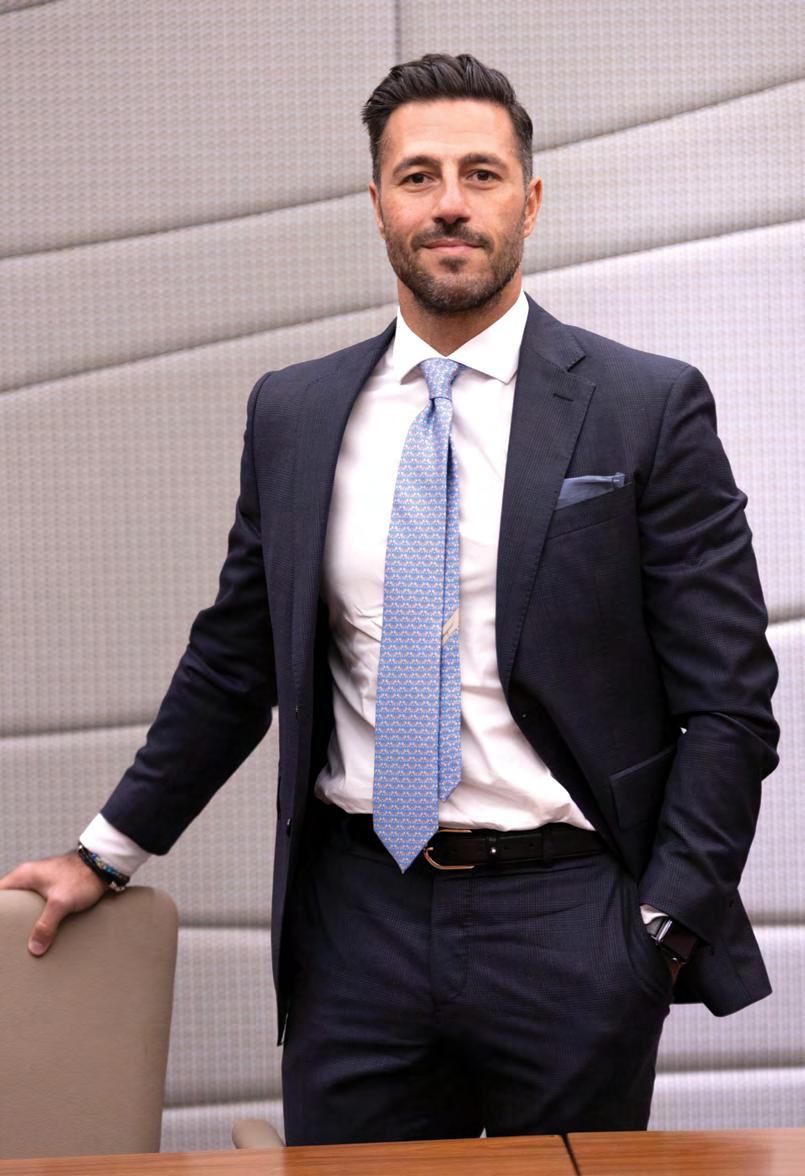


“PART OF OUR GREEN STRATEGY IS TO COLLABORATE WITH PARTNERS THAT HAVE A SIMILAR STRATEGY THAT WANT TO DRIVE THEIR EMISSIONS RATE DOWN. BUT AT THE END OF THE DAY, ECONOMICALLY IT MUST MAKE SENSE.”
Ayman began his career in the logistics industry in 2005 with Expeditors International as a management trainee after completing his bachelor’s degree in Business & Information Systems.
After developing his skills and progressing in several roles at Expeditors, his career continued to excel when he joined CEVA Logistics as a general manager for the Middle East, Africa, Balkans, and Central Asia. In 2017, Ayman earned an MBA from Hult International Business School and shortly after he gained his executive diploma from MIT in digital transformation. Since 2018 he has used his vast experience and deep knowledge of the logistics industry to serve in his role as Commercial Director for Agility. Ayman is a guest lecturer at Paris Sorbonne University Abu Dhabi, Heriot-Watt University Dubai, and coach to students at the Hult International Business School in Dubai. He is frequently invited to participate in guest panels and other recognised industry events.
He is a skilled negotiator, expert in sales, dedicated team leader and has built a reputation for developing innovative business strategies. A passionate and ambitious professional, Ayman is equipped with excellent communication skills which include proficiency in English, Arabic and French that has helped him build strong and longstanding business relationships within the industry.
Ayman’s competitive nature and determination has enabled him to train and compete in triathlons and international cross-fit tournaments. He is also a keen motorcycle enthusiast and has organised several autism awareness rides with his motor club.
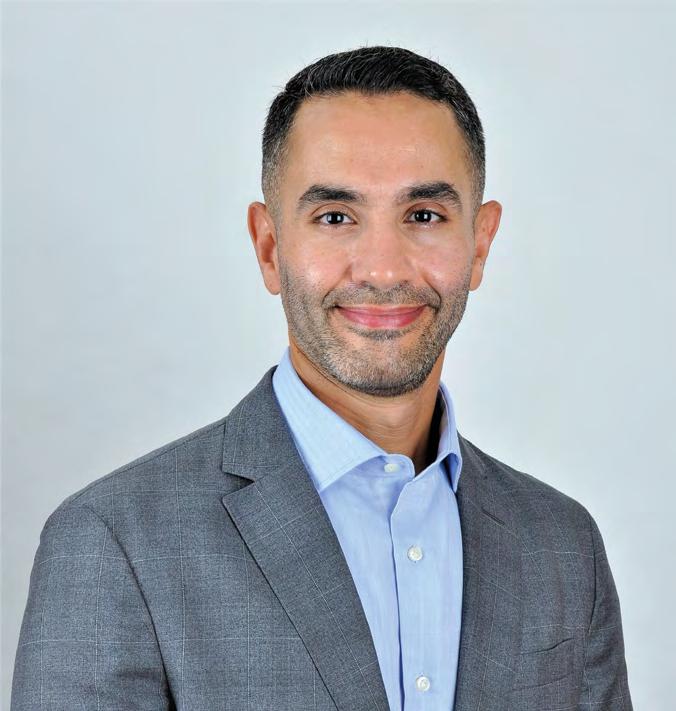
ALAA HAWARI, GENERAL MANAGER AT TRANSPORTR, reveals how the pandemic disrupted the traditional logistics sector and accelerated the need for digital freight solutions
TELL US ABOUT TRANSPORTR AND THE SOLUTIONS IT PROVIDES TO THE LOGISTICS INDUSTRY.
Transportr was established with a mandate to digitalise the entire supply value chain including all modes of transportation. We focus on land and sea freight, and
with our recent agreement with Etihad Rail we will soon offer digital rail freight solutions.
Our vision is to become the largest digital door-todoor logistics provider in the region and truly transform the way freight is moved. Our digital technology
enables shippers to simply log into our platform, place a shipment request in three clicks, view the best offers, and select a suitable carrier. Additionally, the platform allows users to track shipments in real-time, and receive analytics on logistical performance.
WHY IS THERE A PRESSING NEED TO AUTOMATE FREIGHT SERVICES?
Traditional logistics industry still uses MS Excel to source, compare and analyse freight rates from carriers, which is an extremely timeconsuming process, subject to human error as well. Digital freight procurement allows users to automate this entire process, ensuring efficiency to the entire supply value chain through timely delivery of products and services.
Globally, COVID-19 has caused severe disruptions within the logistics industry while spearheading the digital transformation journey of various organisations across the supply chain. The pandemic has managed to string the entire industry together via digital alternative solutions to navigate the complexities of freight procurement.
WHAT IS LACKING IN THE REGION’S LOGISTICS INDUSTRY AND WHAT IMPROVEMENTS CAN BE MADE?
Supply chains are becoming increasingly complex, while the region’s freight procurement process has barely changed over the past two decades. This complexity and network-based nature of logistics offer a wide range of opportunities for automation and data-driven decision making.
Our platform captures volumes of data points daily, and we use this to conduct predictive modeling associated with projected throughput traffic, potential future supply shortage, and performance patterns.
The analytics team at Transportr plays a cru-

cial role in offering transparency and maintaining the balance between demand and supply while securing reverse loads to solve the challenge of empty miles in trucking, accounting for 40 percentage of total miles driven by freight carriers.
WILL THE EXPO 2020 DUBAI GIVE A MUCH-NEEDED BOOST TO THE LOGISTICS INDUSTRY?
One of the main pillars of the Expo 2020 is Mobility which not only revolves around passenger transportation but accounts for cargo movement as well. The UAE has some of the busiest air and seaports throughout the world due to its strategic location and has been one of the key focus areas for the government’s initiatives. Coupled with participation from private organisations in the supply chain industry, the Expo 2020 is bound to boost and help the logistics industry thrive.
HOW HAS THE PAST YEAR BEEN FOR TRANSPORTR, ESPECIALLY DUE TO THE PANDEMIC?
Transportr was launched in Abu Dhabi few months prior to COVID-19 becoming a pandemic. The unprecedented collapse of the global economy coupled with the traditional shipping industry ripe for disruption, enabled Transportr to enter the market and conclude partnerships with leading regional logistics players. We established a strategic partnership with Abu Dhabi ports to manage our inland container depot (ICD) in Musaffah, to provide handling facilities within the ICD and deliver fully inclusive transportation solutions for containers between the ICD and Khalifa Port.
We also recently signed an agreement with Etihad Rail, the developer and op-
erator of the UAE’s national railway network, where we will work together to enable streamlined services in the logistics sector through rail digital solutions such as booking, tracking, and multi-modal connectivity.
Regulatory changes can be challenging at times, impacting the supply side, and this results in sustained higher freight prices as seen in some cross border routes over the past few months.
On the technical front, Transportr faces challenges in integration with our door-to-door logistics solutions since we consolidate different types of parties in each shipment. This complexity arises since a simple shipment can involve up to 16 different parties ranging from ocean carriers, trucking vendors, border agents, warehouse operators, drivers, and assurance companies.
Finally, when it comes to our sea freight part of Transportr, globally the industry is facing high and fluctuating sea freight rates, container shortages and limited vessel space.
Having said that, Transportr has been able to eliminate shipping stress by locking freight, containers, and space ahead of time enabling our clients to grow and
expand their business regionally and internationally.
Exponential growth. Locally, we aim to capture a significant market share in the UAE by the end of 2021 supported by officially launching the very first ICD based in Mussafah for our client base after running successful test shipments over the course of the previous months.
Regionally, we are in the process of establishing our offices in Saudi Arabia while concluding strategic partnerships with dominant logistics players in the Saudi market.
On the technology front, digital solutions backed by data is our core focus and we are currently strengthening our team through the hiring of additional technology professionals.
Finally, the launch our of sea platform is going to be a monumental milestone for us since, we will be the first in the region to offer multi modal freight services.
“THE UNPRECEDENTED COLLAPSE OF THE GLOBAL ECONOMY COUPLED WITH THE TRADITIONAL SHIPPING INDUSTRY RIPE FOR DISRUPTION, ENABLED TRANSPORTR TO ENTER THE MARKET AND CONCLUDE PARTNERSHIPS WITH LEADING REGIONAL LOGISTICS PLAYERS.”

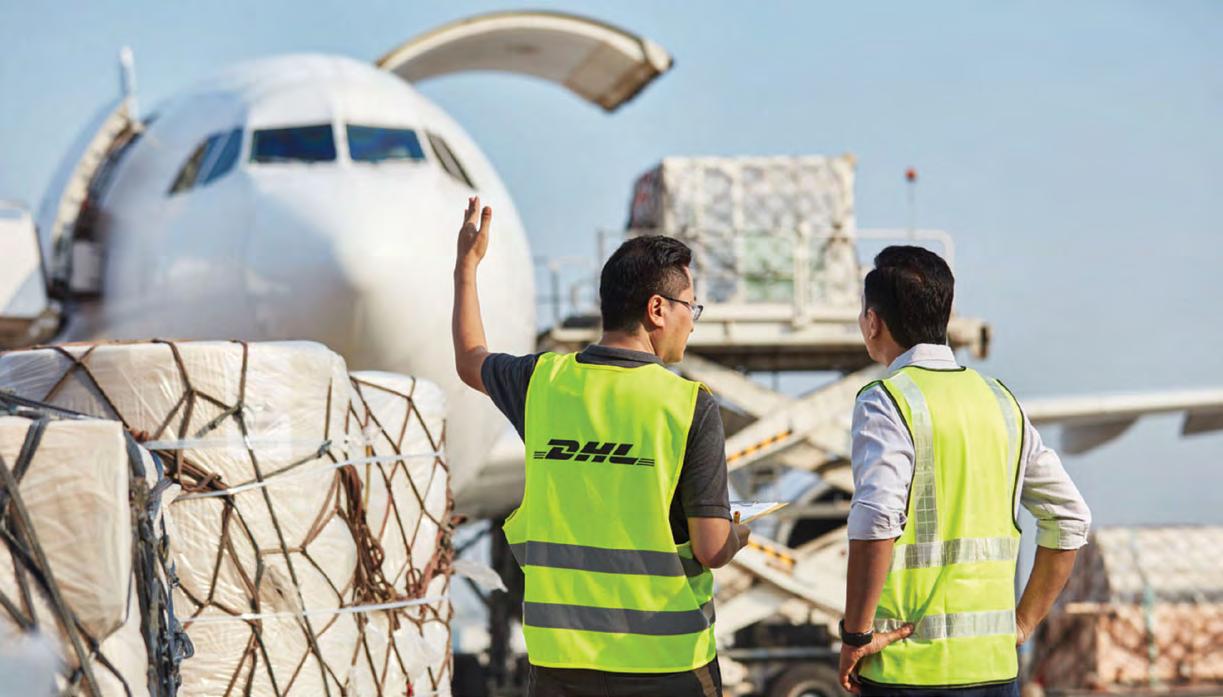
DHL BELIEVES FROM 2022 ONWARD, A FURTHER SEVEN TO NINE BILLION DOSES OF VACCINES WILL BE REQUIRED ANNUALLY TO KEEP (RE-) INFECTION RATES LOW
Global logistics leader DHL has released a white paper highlighting its learnings from one year of fighting the pandemic and how to prepare to handle public health emergencies in the future. “Revisiting Pandemic Resilience” examines the role played by logistics and supply chain management in handling the largest global health crisis in more than 100 years. DHL has played a vital role in the fight against the virus since the beginning, ensuring the availability and distribution of medicines and medical supplies, test kits, ancillary supplies, treatments, and personal protective equipment (PPE).
DHL’s Global Humanitarian Logistics Competence Center in Dubai coordinated the movement of aid and relief for needy communities on behalf of humanitarian organizations.
Global distribution
In the past four months, DHL has distributed over 200 million doses of all approved vaccines to over 120 countries through 9,000 operated flights, with more than 350 DHL facilities involved.
Over 50 bilateral and multilateral collaborations with partners in both the pharma and public sector and several new dedicated services were created to stem this task.
Thomas Ellmann, Vice President, Life Sciences & Healthcare and Head of Clinical Trials Logistics at DHL Customer Solutions & Innovation, said: “The past one year has highlighted the importance of logistics and supply chain management to manage the pandemic, ensure business continuity and protect public health. It has also shown us that together we are stronger. Multisectoral partnerships enabled vaccine distribution at unprecedented speed.”
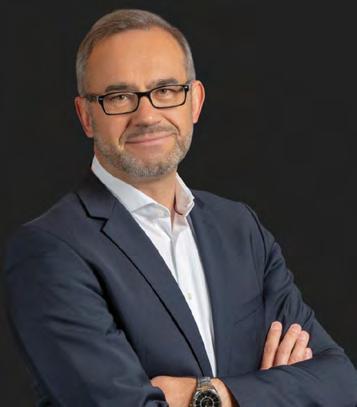
According to the DHL white paper, the past one year witnessed important achievements across research and development, production, and supply chain management as well as policy; chief among them being a vaccine developed five times faster than any other vaccine in history.
Production was ramped up in record time – quadrupling pre-COVID vaccine production capacities, while logistics rolled the distribution three times faster than usual, building unprecedented cold chains with stringent temperatures of up to - 70°C.
Multi-sector collaboration
An unprecedented level of multisector, international collaboration – including logistics and pharma companies as well as the public health and military infrastructures of many governments – has been a key driver in the fight against COVID-19. HOPE Consortium, the UAE-based public-private partnership coordinated the safe and efficient international distribution of billions of doses of COVID-19 vaccines, with the help of commercial partners such as DHL to expand its global reach and strengthen logistical solutions. Logistics couriers were allowed to transport vaccine doses on military helicopters or boats to avoid traffic jams and speed up delivery.
Katja Busch, Chief Commercial Officer DHL & Head of DHL Customer Solutions & Innovation, added: “The UAE’s
significant investments in creating robust air, sea and land infrastructure facilitated logistics and vaccine distribution, helping us keep supply chains resilient. While the race against the virus continues, leveraging the power of such collaborations and data analytics will be key.
“We need to remain prepared for high patient and vaccine volumes, maintain logistics infrastructure and capacity, while planning for seasonal fluctuations by providing a stable and well-equipped platform for the years to come.”
It is estimated around 10 billion vaccine doses are required globally by end of 2021. While the UAE and Bahrain have some of the highest per-capita rates of immunisation in the world, less-developed infrastructure in other countries has made the vaccine rollout challenging.
The UAE set up storage facilities with the capacity for millions of vials to cover its own domestic demand as well as to stockpile the vaccine for countries that lack adequate storage. The UAE’s humanitarian efforts throughout the pandemic have been enabled by successful partnerships between super connectors such as Emirates and logistics leaders such as DHL.
In 2022-2023, around seven to nine billion additional doses of vaccines annually will be necessary to keep (re-) infection rates low and slow down the pace of virus mutations. The COVID-19 pandemic is a dynamic situation, as is the virus that
causes it. It is not only imperative to vaccinate the world as quickly as possible, but to ensure immunization is sustained in the years to come. As a result, the COVID-19 supply chain and logistics setup in 2021 will remain important going forward.
“WE NEED TO REMAIN PREPARED FOR HIGH PATIENT AND VACCINE VOLUMES, MAINTAIN LOGISTICS INFRASTRUCTURE AND CAPACITY, WHILE PLANNING FOR SEASONAL FLUCTUATIONS BY PROVIDING A STABLE AND WELL-EQUIPPED PLATFORM FOR THE YEARS TO COME.”
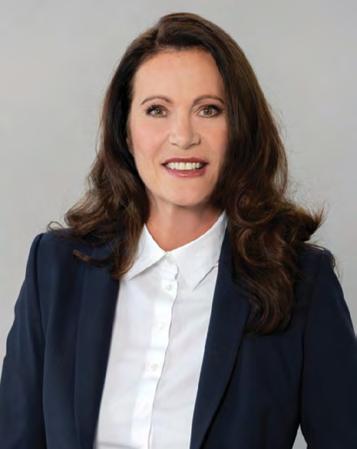
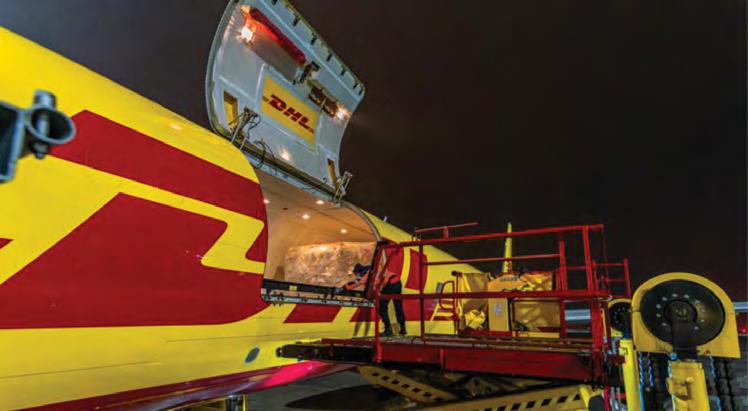
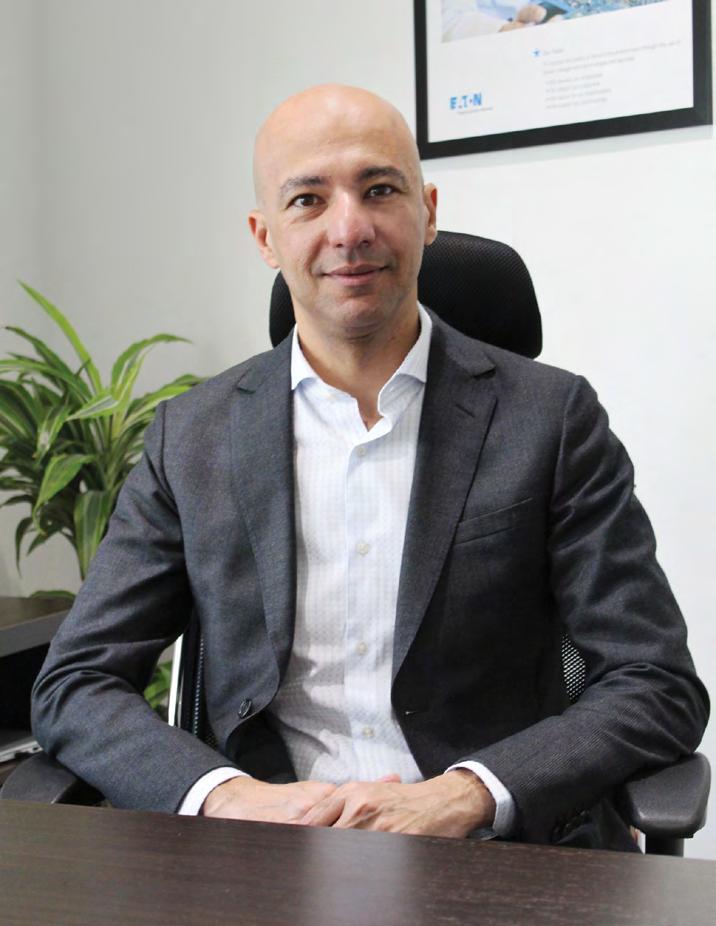
ASHRAF
, MANAGING DIRECTOR, EATON MIDDLE EAST, TELLS US HOW THE DEMAND FOR ELECTRIC VEHICLE CHARGING INFRASTRUCTURE IS GROWING AND HOW IT CAN BE COST EFFECTIVE AND SUSTAINABLE FOR PROPERTY OWNERS AND LEASEHOLDERS
Automobiles have come a long way from the hand crank engines of the early 20th century. These days you can remote start an engine or schedule an autonomous start and stop, open car doors, and maintain internal temperatures using a mobile application.
More drivers are choosing to use electric vehicles across the UAE and in the Middle East. The rise in popularity can be attributed to the dropping cost of EVs in the past five years.
Other reasons include the rockstar status of Elon Musk, who is considered as the poster boy of EV, and the support of various regional incentives such as free charging, free parking, reduced electric vehicle registration fees, and exemption from Salik tag fee.
Keeping up with the trend, all major automobile manufacturers have plans for EV or plug-in hybrid vehicles (PHEV) across configurations such as sedan, SUV, and crossovers. Soon, customers would be spoilt for choice for electric or hybrid cars. These initiatives stem from the emirate’s efforts to provide innovative and sustainable transport solutions as part of the Dubai Green Mobility Strategy 2030, thus contributing towards carbon emission reduction in the transportation sector.
These, coupled with a stronger desire among users to use a vehicle with a far less damaging impact on the environment, have led to increased electric cars in the region.
Whatever the reason, the demand for EV charging facilities is rising fast, putting pressure on commercial buildings to provide EV charging infrastructure (EVCI). Public and private sector investment in EVCI is needed, which could be challenging in the post-Covid world.
Still, the good news for property owners and leaseholders is that EVCI can be provided sustainably and cost-effectively. At the same time, this rise in demand will also put existing electrical infrastructure and the grid under pressure, with intermittent loading without viable control processes.
Why commercial buildings?
Traditional vehicle owners have access to petrol stations to fuel their vehicles and do so within minutes. For EV owners, their car needs to be plugged in for several minutes up to six to eight hours depending
on the charger, for a full charge. Therefore, commercial buildings have a unique opportunity to provide EV charging where the vehicles are parked for a reasonable amount of time.
Obvious sites for EVCI include petrol stations and service stations that offer cafés, shops, and restaurants. Charging infrastructure can also be installed at car parks serving commercial buildings such as malls, supermarkets, airports, stadiums, universities, offices, and hotels. Depending on the time they plan to spend at these locations, EV owners can choose between faster DC chargers, or AC chargers that take longer, if they are spending hours in the office or at home.
Opportunities for commercial buildings EV owners will consider the availability and ease of charging their cars when choosing outlets to visit. Especially now when there are only a few options to choose between. Apart from driving loyalty, these outlets will be associated with those taking steps to tackle climate change, especially depending on the source of the EVCI.
Choosing to self-generate renewable power and consume it on-site for EVCI is likely to prove a marketing advantage, as well as being intrinsically beneficial.
Installing a renewable energy generating system, such as one based on solar PV panels, enables commercial buildings to dramatically reduce the costs of powering EVCI as well as the load on the grid.
Connecting the PV cells to behind-themetre battery storage can be consumed immediately or stored for use later. This would be highly beneficial in the future when utility companies implement costreflective tariffs, and the stored energy can be used to charge EV’s when the grid is at its most expensive.
The wider sustainability benefit of this is that it enables what is known as ‘peak shaving’ - reducing the load on the grid to prevent the grid from being switched to carbon-intensive, fossil-fuelled power. Choosing an EVCI based on self-generated renewable energy and battery storage also reduces capital expenditure.
There are various ways that commercial buildings can create revenue streams from EVCI. The most obvious involves setting a fee for the service provided. Other
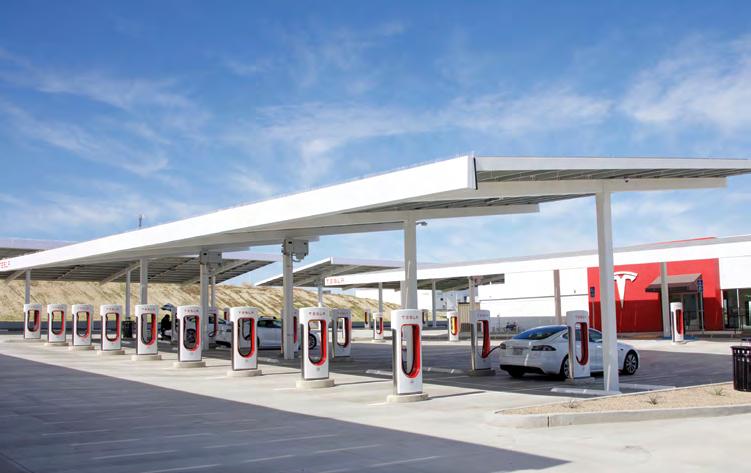
WHATEVER THE REASON, THE DEMAND FOR EV CHARGING FACILITIES IS RISING FAST, PUTTING PRESSURE ON COMMERCIAL BUILDINGS TO PROVIDE EV CHARGING INFRASTRUCTURE (EVCI). PUBLIC AND PRIVATE SECTOR INVESTMENT IN EVCI IS NEEDED, WHICH COULD BE CHALLENGING IN THE POST-COVID WORLD.
income may come from offering services to the grid: bi-directional energy flows may enable renewable energy generators to sell their surplus to the grid if they do not use it, and they may be incentivised by peak-shaving (easing pressure on the grid at peak demand).
As EV usage increases, an EVCI based on a renewable system and battery storage is scalable simply by adding generating capacity (more PV panels, for example) and adding battery packs to increase storage capacity.
As more consumers choose to drive EVs in the coming years, a big challenge will be facilitating this transition without causing energy prices to increase or de-stabalising the grid. Technologies such as smart charging, Vehicle-to-Grid (V2G), and DC microgrid will help overcome this challenge.
‘Smart charging’ shifts the EV load between the renewable source and the grid depending on the availability of the renewable source. Vehicle-to-Grid (V2G)
will take smart charging to the next level by allowing the battery in a parked EV to inject electricity into the grid, opening more value streams by supporting grid balancing.
A DC microgrid system enables prioritisation of power flows to minimise peak demand and provides a more straightforward way to update existing local infrastructure to enable cost-effective EV charging.
Commercial buildings considering hosting EVCI need to think about both the challenges and opportunities and then plan accordingly. Undertaking an initiative to install EV charging means thinking about transforming either existing or new car parking space into a sustainable charging hub.
Should it prove necessary to expand the grid connection and upgrade power distribution equipment, the upfront costs of installing EVCI can be high. However, this can be mitigated in the long term by installing renewable power generation integrated with an energy storage system.

A SURVEY DONE BY TRADELING SHEDS LIGHT ON KEY LEARNINGS EMERGING IN THE B2B ECOMMERCE SECTOR AND OUTLINES HOW THE PANDEMIC CAUSED MANY BUSINESSES TO VIEW ECOMMERCE IN A NEW LIGHT
The COVID-19 pandemic has radically altered the trade sector creating more opportunities in the eCommerce domain. A study release by Tradeling, the eMarketplace focused on business-tobusiness (B2B) transactions in the MENA region, has highlighted five key new trends in the B2B eCommerce sector.
The White Paper, Pivoting to Digital: The Transformation of B2B eCommerce in the Middle East, shows how the unprecedented challenges brought on by the global pandemic necessitated a new model of retail that is driven online.
The top findings of the survey, one of the first authoritative studies on the impact of the COVID-19 pandemic on trade and business confidence in the region, focused on five key areas: business community, growth industries, eCommerce, small and medium-sized enterprises, and COVID-19.
Dr. Mohammed Al Zarooni, Director General of Dubai Airport Freezone Authority (DAFZA), said: “The study serves as a blueprint for both the public and private sector by providing an informative
and unique perspective on the UAE and Saudi Arabian business community and shows how they are using B2B eCommerce.”
He added: “The findings of the Tradeling Pivoting to Digital survey reveal the unique complexities and opportunities in the world of B2B eCommerce. The results from the UAE and Saudi, two of the most active markets in the GCC, provide evidence-based insights on a new fast-tracked digital world brought on by the pandemic.
“Whatever held back the growth in eCommerce for nearly two decades, especially in the Middle East region, has disappeared. At the height of the pandemic, customers had little choice but to resort to online shopping, and with it the floodgates of business opportunities opened.”
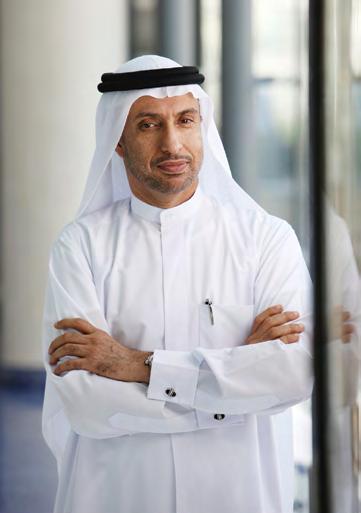
The study evaluated the immediate impact of COVID-19 as well as the role of B2B in mitigating it.
Marius Ciavola, CEO, Tradeling, said: “We are honoured to present this study, which reiterates our commitment to working together to building a strong trade sector that will continue to be one of the key contributors to the economy.
“This white paper follows the success of Tradeling’s business model, which encouraged us to study the marketplace further, especially given the lack of informed data on B2B eCommerce. While there are several studies on consumer eCommerce, online B2B trade in the region has gained little attention from researchers, primarily because it has been fragmented in its delivery and continuity.”
Adapting to new realities
Nearly two-thirds of all respondents in the UAE and about half (49%) of Saudi businesses surveyed said the pandemic has had a negative impact on their business.
However, most companies (79%) expect to make a complete recovery by the end of 2022, and over half (57%) are confident of a business recovery by the end of this year. Businesses reported an increased use of B2B eCommerce due to the pandemic with 82%, on average, citing that their use has increased.
B2B eCommerce has had a positive impact on businesses in adapting to a new reality with most businesses opting to conduct transactions online as opposed to in person due to COVID-19.
Evaluating the market sentiment, a year after the pandemic, the top finding shows that businesses expect to rebound strongly, with greater investment and higher employment in the year ahead.
The survey showed that more than half of businesses (52%) said conditions are ‘good’, highlighting the return to a more positive market sentiment. Positivity about the current market conditions is highest in Saudi Arabia, especially among businessto-consumer companies and more senior employees.
In the UAE, while 45% said the existing business condition is ‘good’, 41% said it is neither ‘good’ nor ‘bad’. In Saudi Arabia, 60% of respondents had a positive outlook, with 31% saying the situation is neither ‘good’ nor ‘bad’.
Asked specifically on the status quo to business-to-business customers, 50% of respondents in both countries said the market conditions are ‘good’.
“WHILE THERE ARE SEVERAL STUDIES ON CONSUMER ECOMMERCE, ONLINE B2B TRADE IN THE REGION HAS GAINED LITTLE ATTENTION FROM RESEARCHERS, PRIMARILY BECAUSE IT HAS BEEN FRAGMENTED IN ITS DELIVERY AND CONTINUITY.”
Most respondents, especially in the UAE are optimistic that business conditions will significantly improve a year from now, with over three-quarters (78%) in the country sharing their optimism on the business environment improving, compared to nearly two-thirds (68%) in Saudi Arabia.
The positive outlook reflects in more businesses expecting to hire further employees as well as increasing their business investment. More than one-third (43%) said they expect the number of employees in their business to increase in the next year.
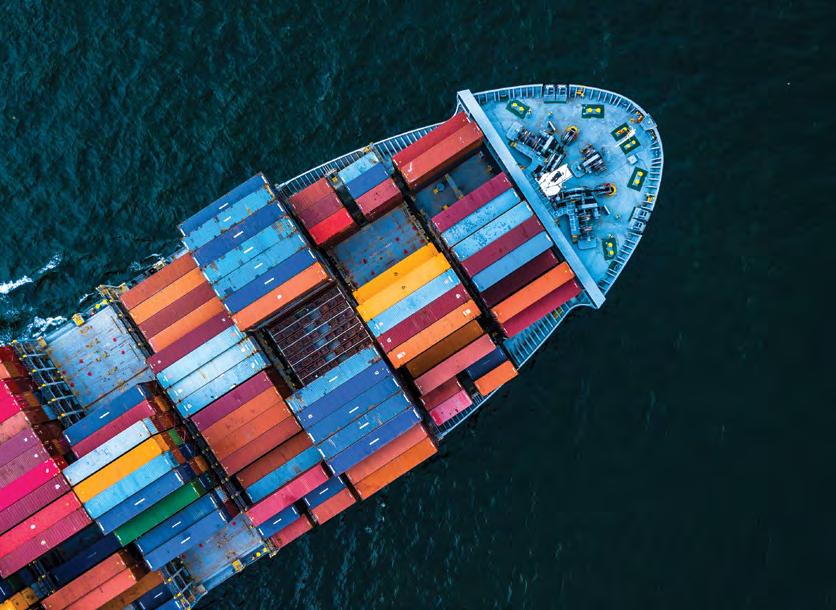
Similarly, when asked about their expectations on investment in their business over the next year, more than half (53%) said it would increase, compared to only 32% who said investment levels will remain the same, and 15% forecasting a decline.
The survey found that eCommerce and technology are set to outpace other sectors of the economy in the coming years as they increasingly leverage digital opportunities both in B2B and B2C trade.
They see a strong outlook for eCommerce in the medium and long-term, building further on the gains achieved in recent months, as enterprises pivot to a ‘digital-first’ model to engage with their customers.
In the UAE, 86% of businesses feel technology will assume greater significant followed by eCommerce at 84%, while both sectors are perceived to grow in importance in equal measure by Saudi respondents at 73% each.
Artificial intelligence (AI) and Machine Learning are seen as the most important
technology impacting business overs the next five years. Specific to B2B eCommerce, 56% of all respondents see AI as the biggest gamechanger.
The study shows that eCommerce is increasingly becoming a preferred platform for purchasing business supplies in both countries. Nearly half (46%) of all respondents said they primarily purchase online.
Most businesses in the UAE and Saudi expect the use of eCommerce to become universal in the coming years with more than four-fifths (82%) of respondents saying businesses will use more B2B eCommerce eventually.
However, respondents said one of the challenges in driving B2B eCommerce will be the need to strengthen online payments as many businesses in the region use physical payments for supplies. More than two thirds (68%) of respondents said they still make physical payments such as cash or cheques on all orders.
IN THE UAE, 86% OF BUSINESSES FEEL TECHNOLOGY WILL ASSUME GREATER SIGNIFICANT FOLLOWED BY ECOMMERCE AT 84%, WHILE BOTH SECTORS ARE PERCEIVED TO GROW IN IMPORTANCE IN EQUAL MEASURE BY SAUDI RESPONDENTS AT 73% EACH.
A large proportion of small and medium-sized enterprises believe that B2B eCommerce offers them opportunities to expand and diversify adding that they are more optimistic that B2B eCommerce will allow a more scalable and diverse range of SMEs to emerge from the region.
Eighty-three per cent of all respondents also agreed to the statement that B2B eCommerce will help local SMEs scale by finding new customers across the region and globally.



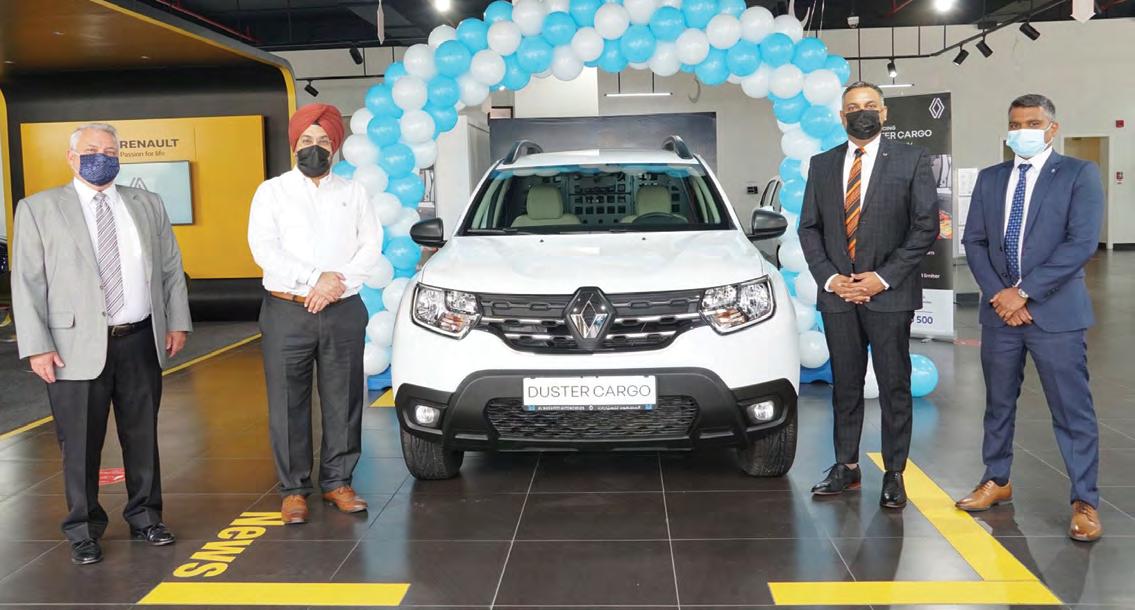
The move comes amidst the car dealership’s changing proposition to address new market needs such as the strong demand for last mile services and improve product mix post-pandemic
As more shoppers continue to shift to eCommerce for all their needs, the growing demand for the fast delivery of their parcels is now changing the game in the world of business.
Companies, especially small and medium enterprises (SMEs), are increasingly relying on last mile services to enhance the overall experience of their customers.
Globally, the last mile market is expected to experience an uptick to reach USD53.4 billion by 2027, according to reportlinker.com against the backdrop of strong eCommerce activities. The same upward trajectory is seen in the UAE market. According to a report by EZDubai in partnership with Euromonitor International and JJL, eCom-
merce is forecast to grow by a CAGR of 19% over 2019-2024, and the online penetration in the Middle East is forecast to double to 6% by 2024, compared to 3% in 2019.
Seeing the trend in last mile logistics, many car dealerships have changed their proposition to suit current market needs and expand their product mix during the pandemic and in its aftermath.
In Abu Dhabi, Al Masaood Automobiles, the authorised distributor of Renault in Abu Dhabi, Al Ain, and the Western region, has responded by launching its all-new customised 2022 Renault Duster Cargo SUV, the first-of-its-kind model for Renault.
Fredrick Vimal, General Manager, Sales-Renault, Al Masaood Automobiles, revealed: “The Renault Duster Cargo is our
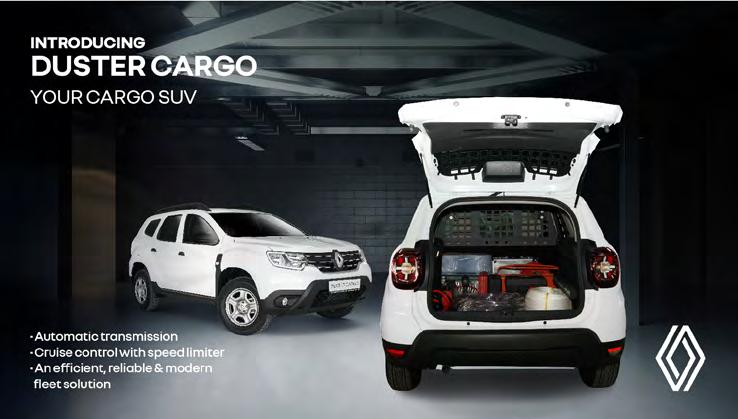
answer to the SME sector’s fast-rising requirement for the best last mile delivery solution. The last mile industry is expanding, and it will continue to grow with customers now turning to digital channels to purchase their essentials.
“We want to not only be part of this trend but also be a pioneer in terms of our offerings. In addition, the launch is in consonance with the UAE Government’s continuing efforts to support SMEs being
the backbone of the country’s economy.”
Now, exclusively available across the company’s Renault showrooms in Abu Dhabi and Al Ain, the model was unveiled to boost and maximise the sales volume of the popular Duster PE 1.6L model.
Specifications and functionalities
Boasting of four-cylinder engine automatic transmission and eco-mode and cruise control/speed limiter features, the innova-
tive Duster Cargo is highly fuel efficient with a consumption rating of 15.9 kilometres (kms) per litre.
The unit, which has a maximum boot capacity of 1,623L, also comes with Bluetooth connectivity and Electronic Stability Programme, amongst other functionalities.
It is designed in a way that it can be utilised for both individual and company purposes, thus blurring the line between business and personal vehicles. This initiative is a unique joint project by Al Masaood Automobiles and Renault teams and the only auto transmission SUV B offered as LCV from the Renault Marque.
Al Masaood Automobiles offers buyers a warranty period of three years or 100,000 kms, whichever comes first.
Backed by decades of global automotive experience, Al Masaood Automobiles has revamped Renault’s brand image across the Abu Dhabi and Al Ain markets by adopting a solid re-formulated and go-tomarket strategy focused on locally based retail and fleet customers.
Over the years, Al Masaood Automobiles has built a highly trusted reputation for its excellence in services and high rate of customer satisfaction.

As the senior administrator in the office and the PR, my goals and objectives are aligned with the progress of our company. At Trukkin, we aim to be a market leader in the logistics and transportation industry. We need to have successful teams and for any team to be successful, they need to have smooth coordination with a high performance and calibre culture. My objective is to ensure that every member of the Trukkin family goes through what is well-coordinated and contribute that highperformance culture. Over the next 10 years, I see myself leading a large administration and PR team at Trukkin.
POSITIONING TRUKKIN AS A MARKET LEADER
I play a significant important role in Trukkin. People call me the nerve centre of the office. I facilitate daily coordination to ensure the team works seamlessly between our various offices in various countries and help them navigate through the various things by molding them to become an expert in their own field to be able to contribute and give their best to Trukkin.
STRONG ATTRIBUTES TO SUCCEED
I have been living and working in the UAE for more than years My work experience has provided me soft skills such as planning to uphold and carry out company office policies and procedures and relevant experience needed to be a strong asset in Trukkin. I am proud of what I have achieved so far, and that is the beauty of loving what you do because it will keep you optimistic, motivated, and make a better decision whether it’s work or life related.
My biggest attribute is my positive attitude. I keep morale high for the team despite whatever stressful conditions the team members are going through. Any start-up company has a high intense environment and I ensure that the team spirit remains high, and I keep a positive attitude and try to instil that in everyone.
TEAMWORK AND ITS IMPORTANCE
I think that when people work together, it can unleash energy that boosts creativity, productivity, engagement, communication, and efficiency.
By being part of a team helps us grow as individuals. In a team, you’ll be able to discover new concepts and ideas from your colleagues who have different experiences and learn from someone
“I
think that when people work together, it can unleash energy that boosts creativity, productivity, engagement, communication, and efficiency.”

else’s mistakes, which will help you avoid future errors. Teamwork is important because it can divide the work and help you in improving your skills. Team members provide support to each other because they understand the demands and stress of completing work, and that is the beauty of teamwork.
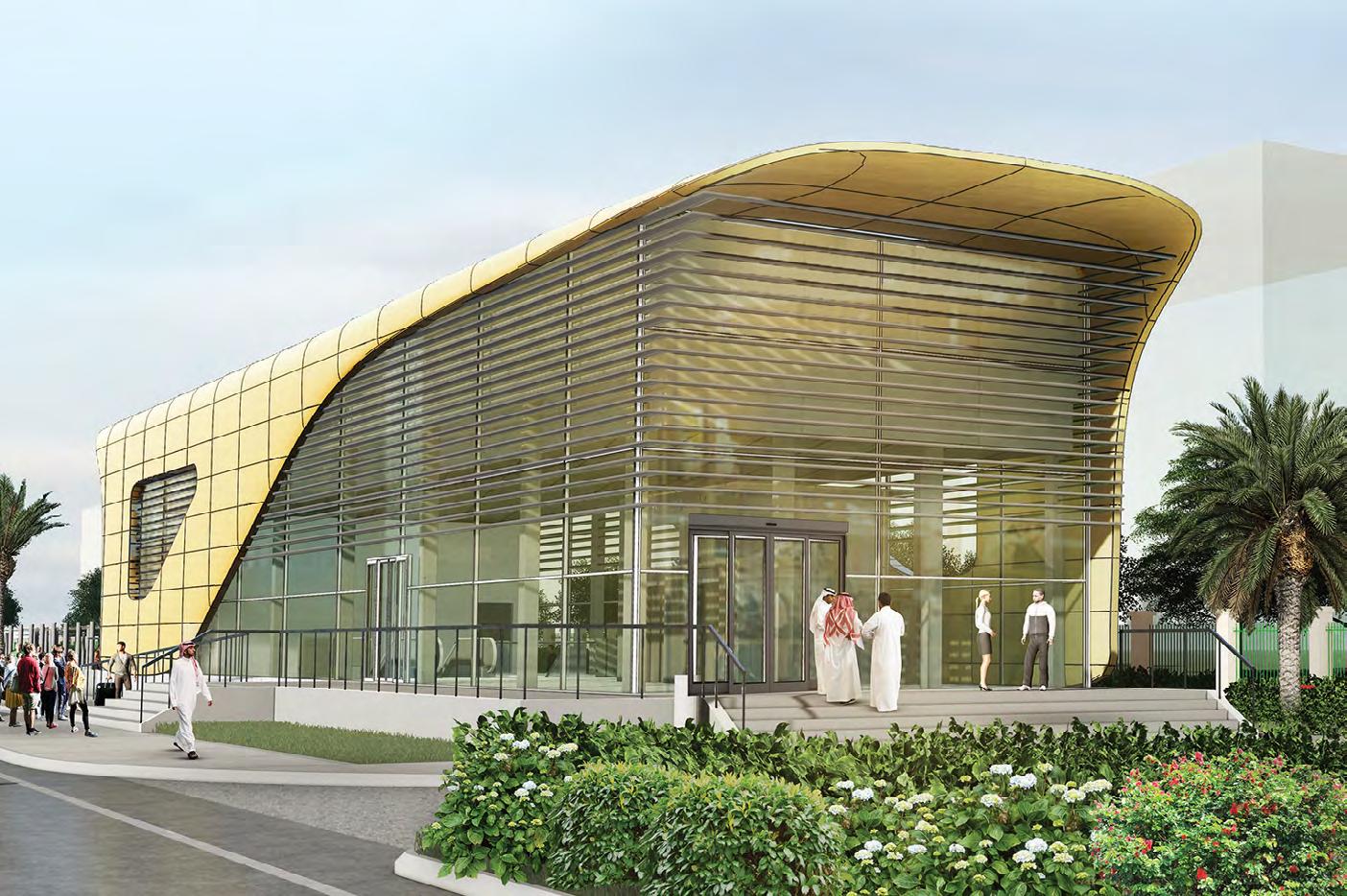

efficient, reliable & modern fleet
This is a first-of-its-kind Cargo SUV model which is now available across Al Masaood Automobile , Renault showrooms in Abu Dhabi & Al Ain.
